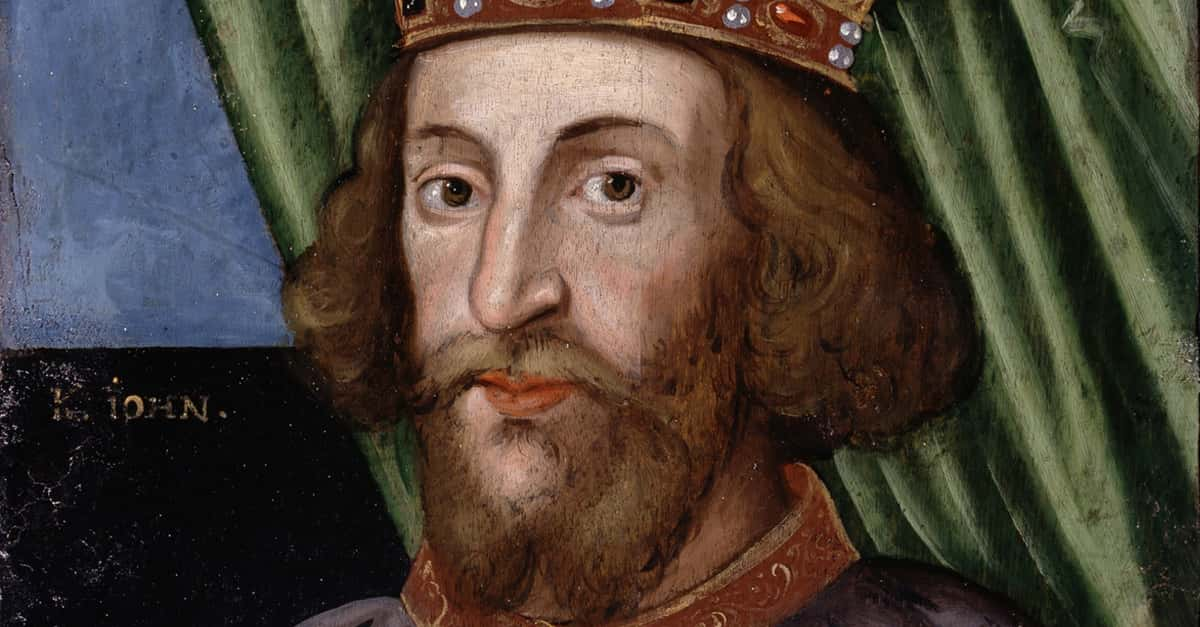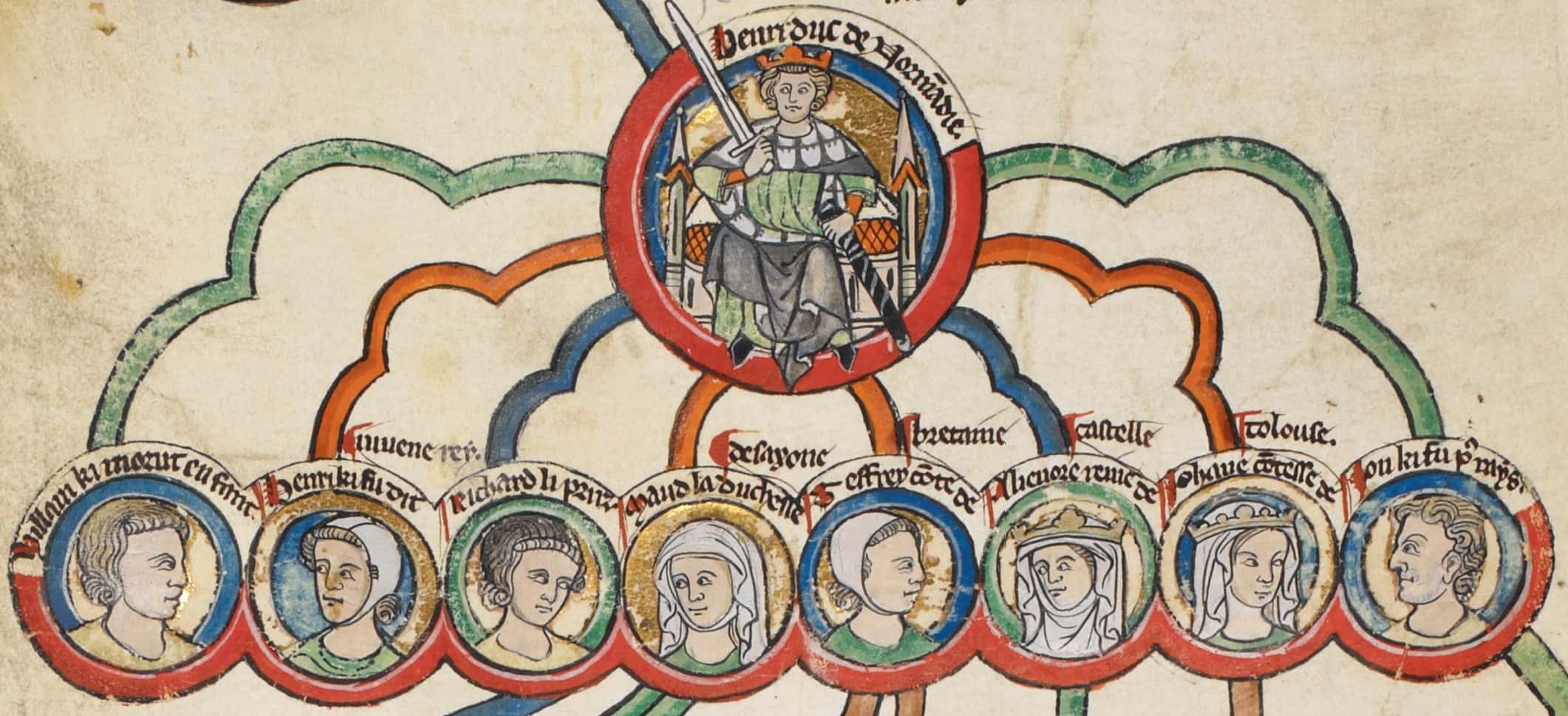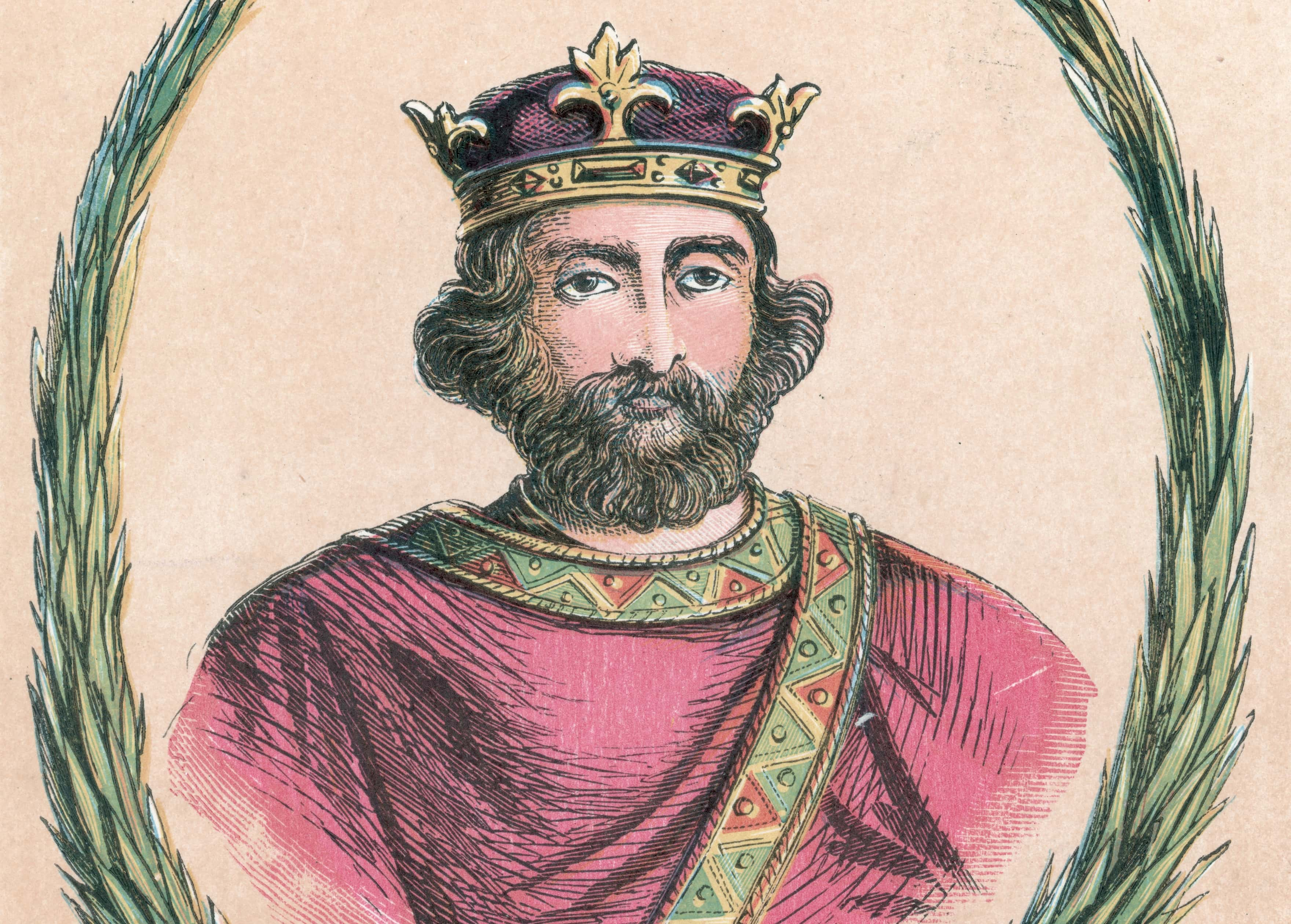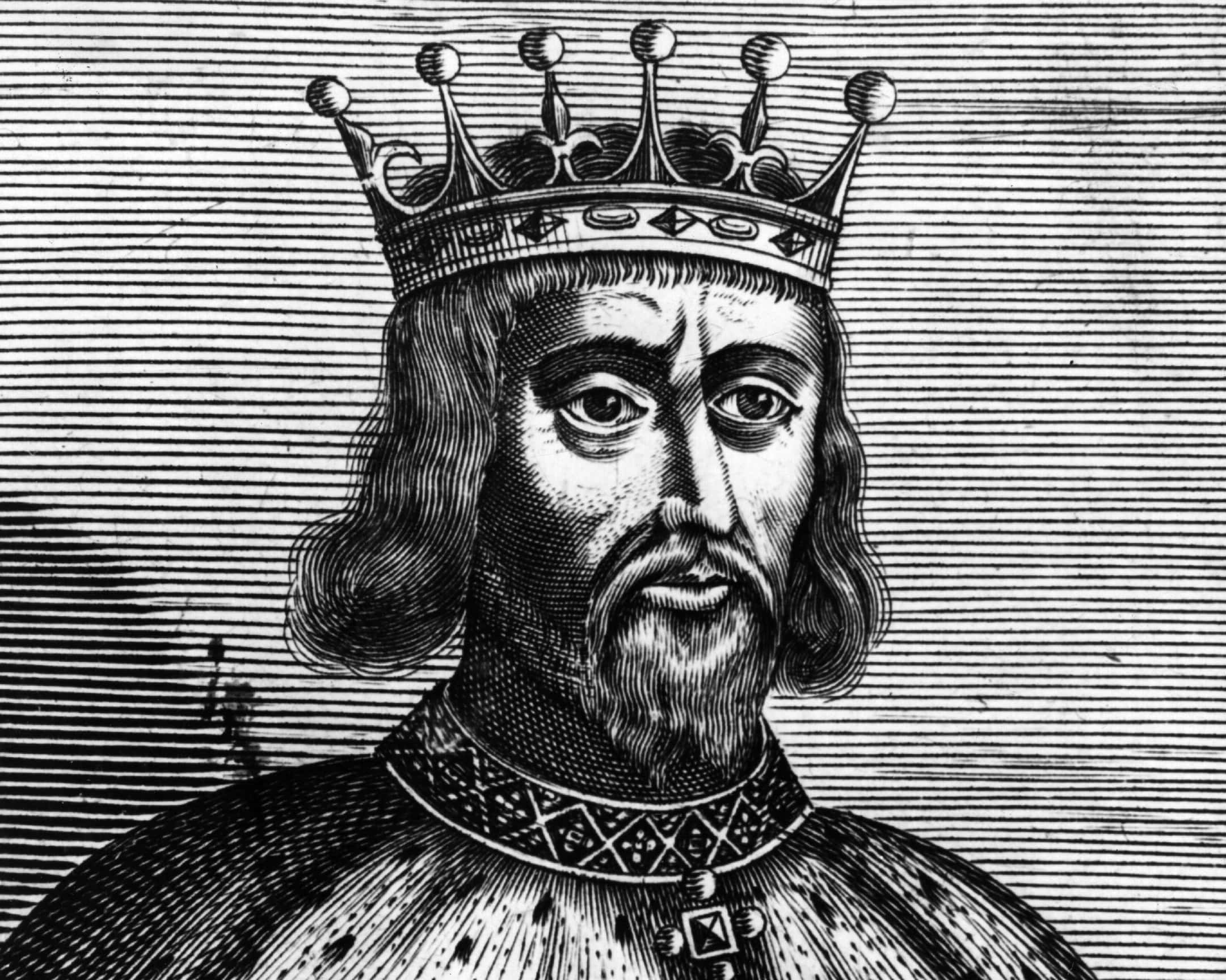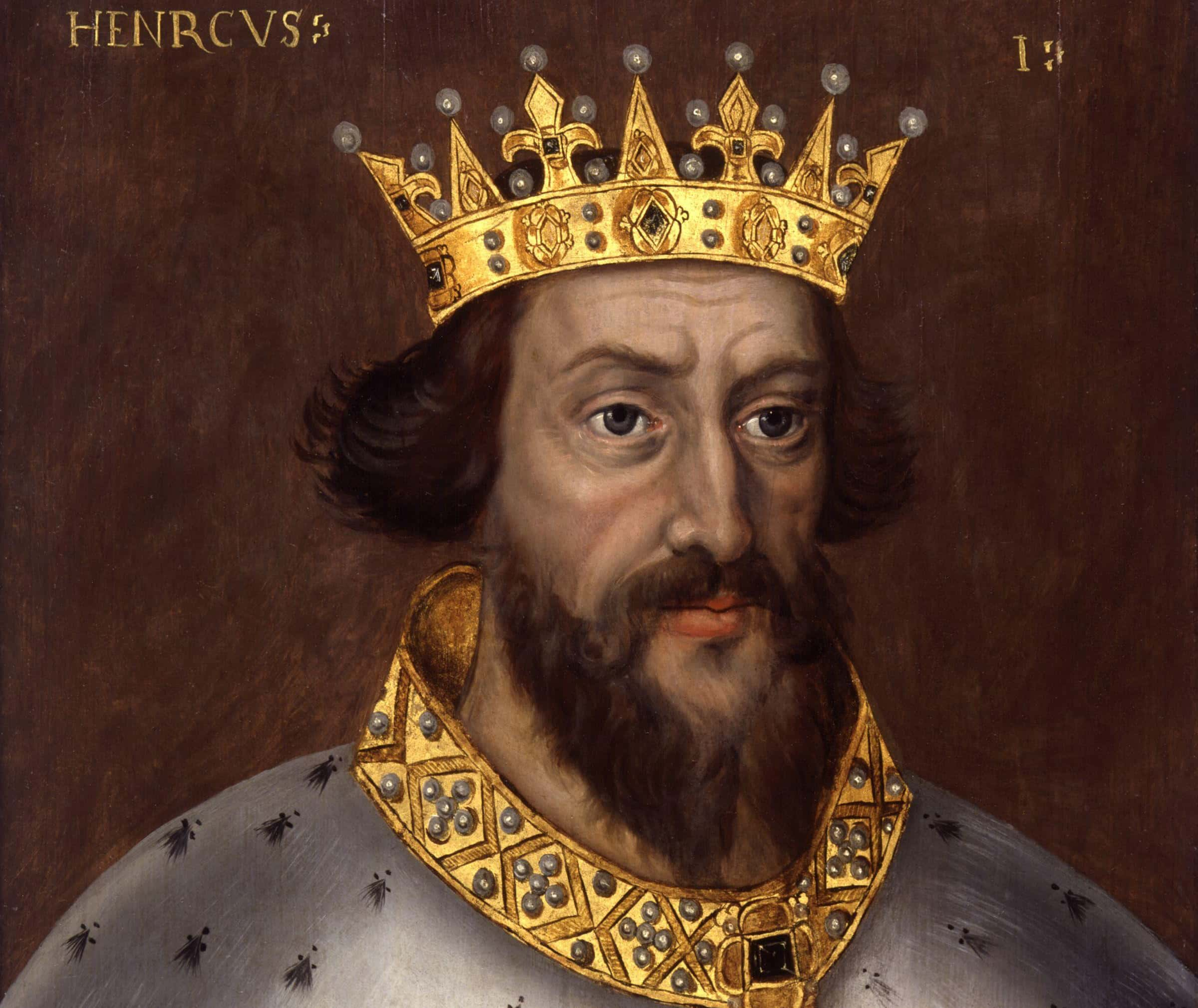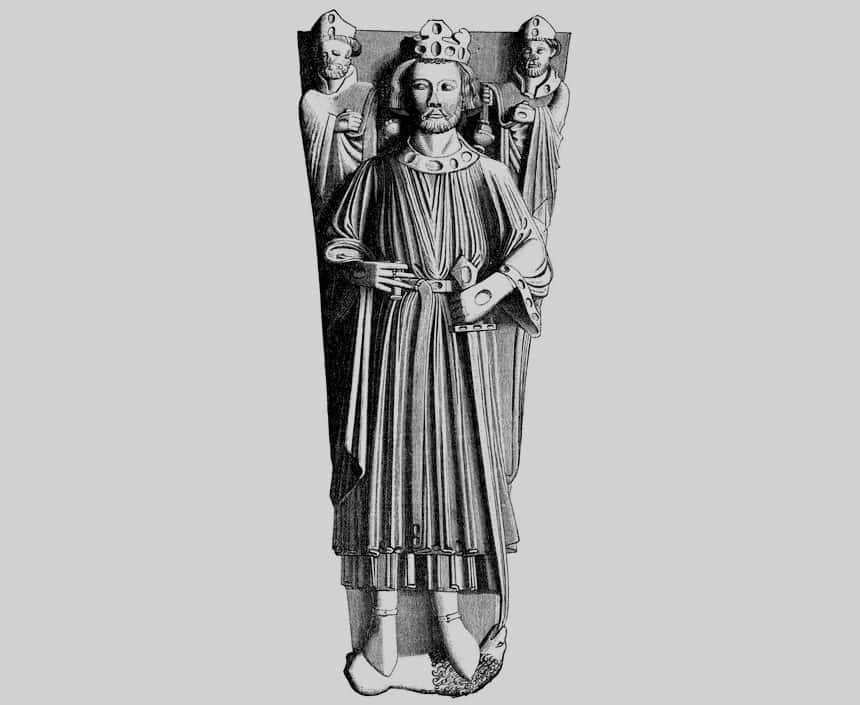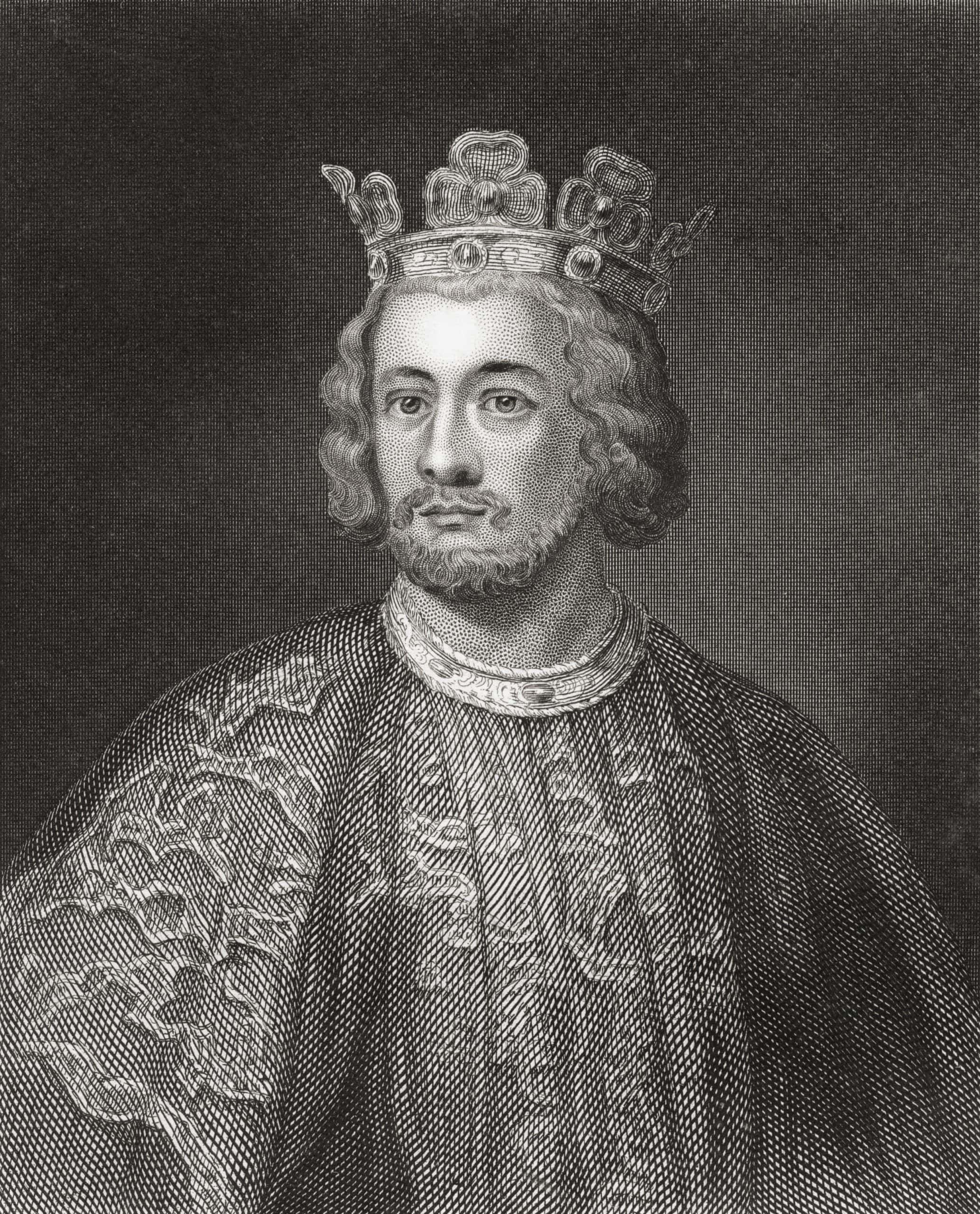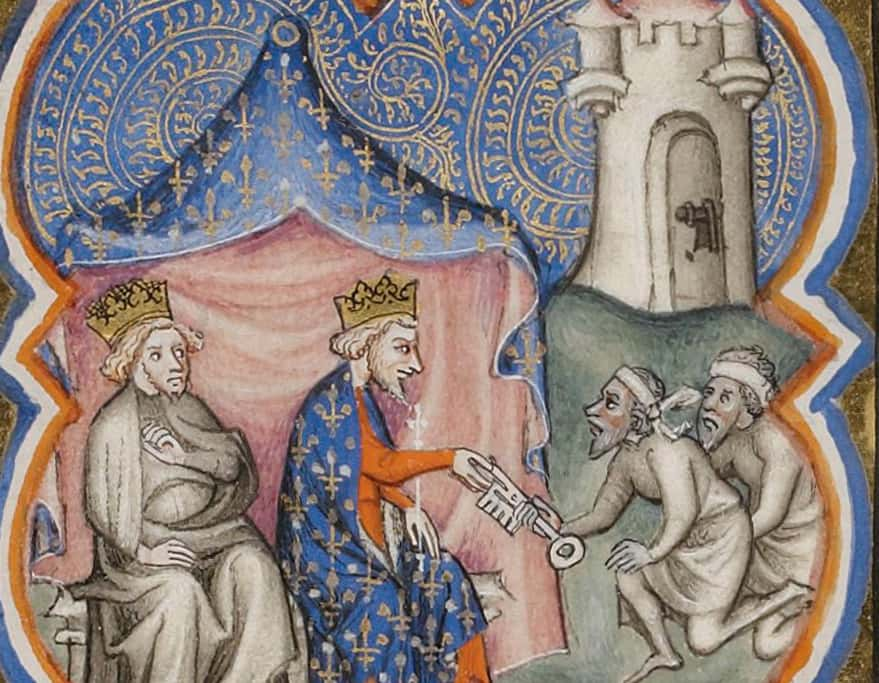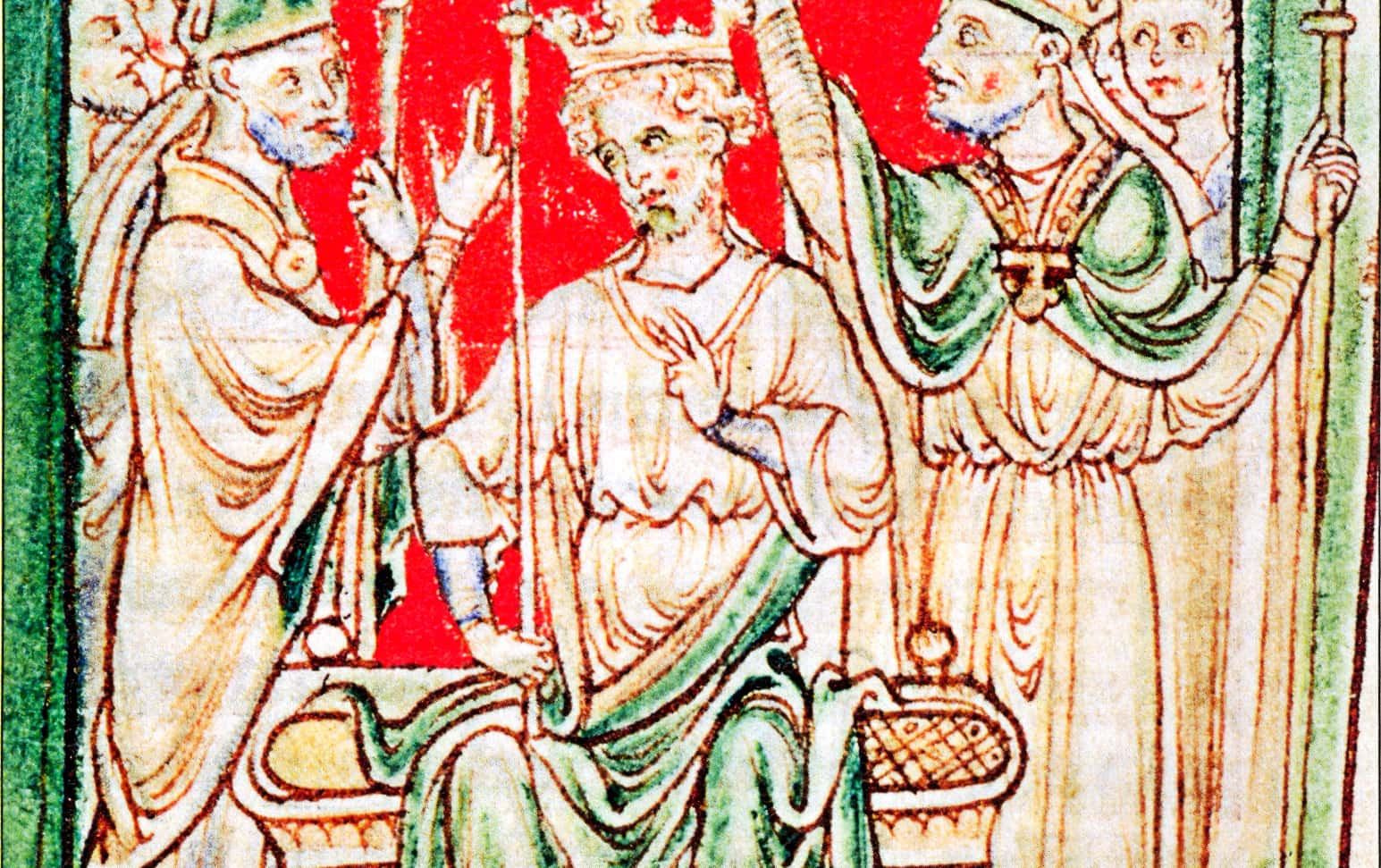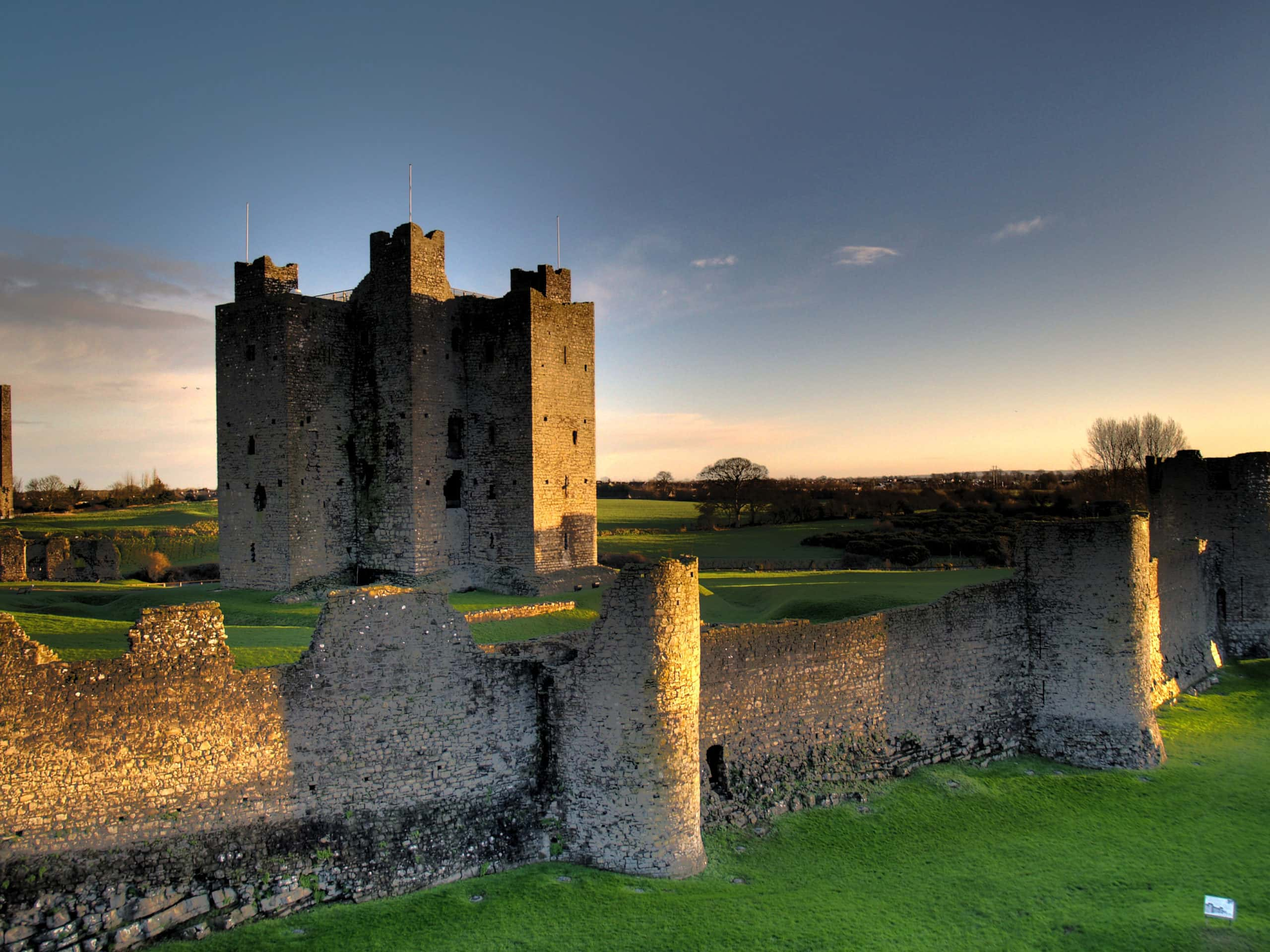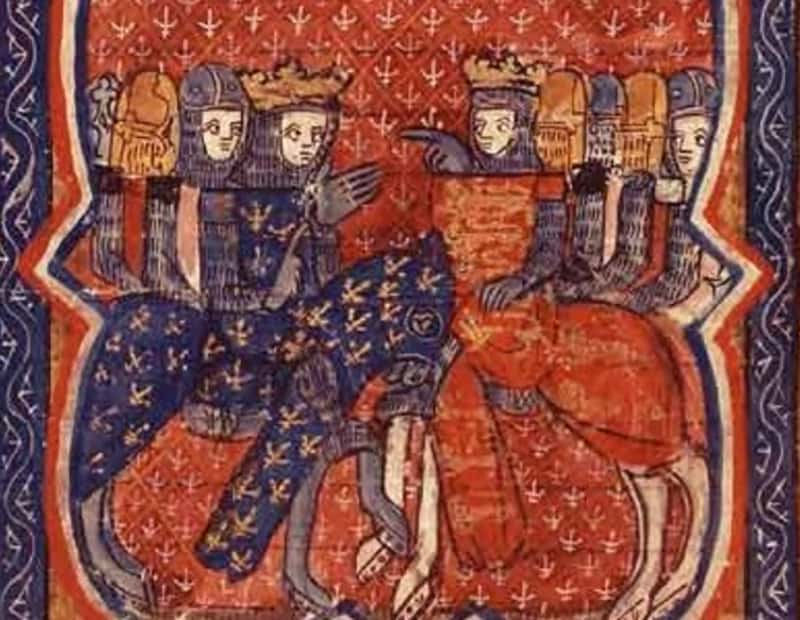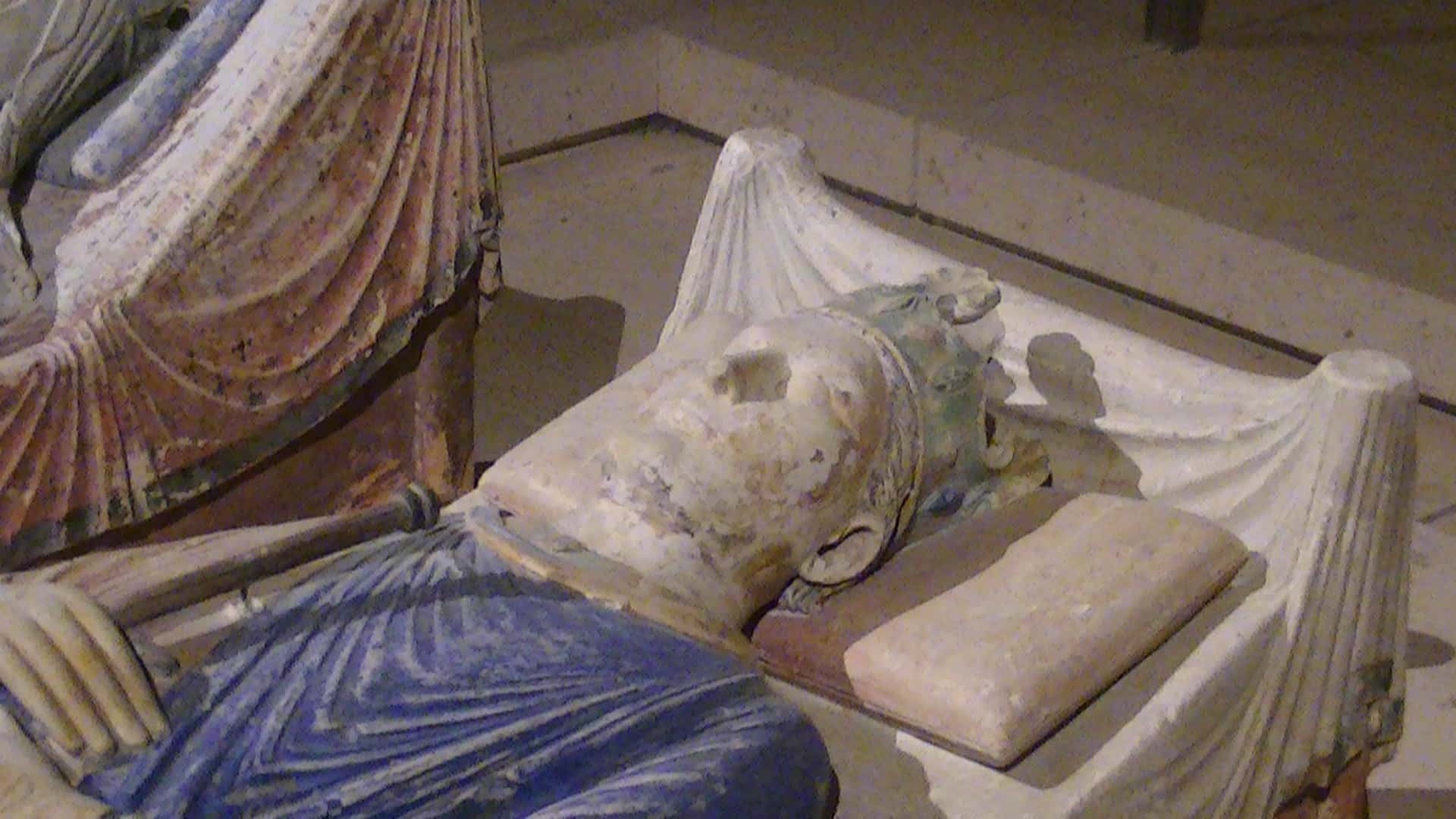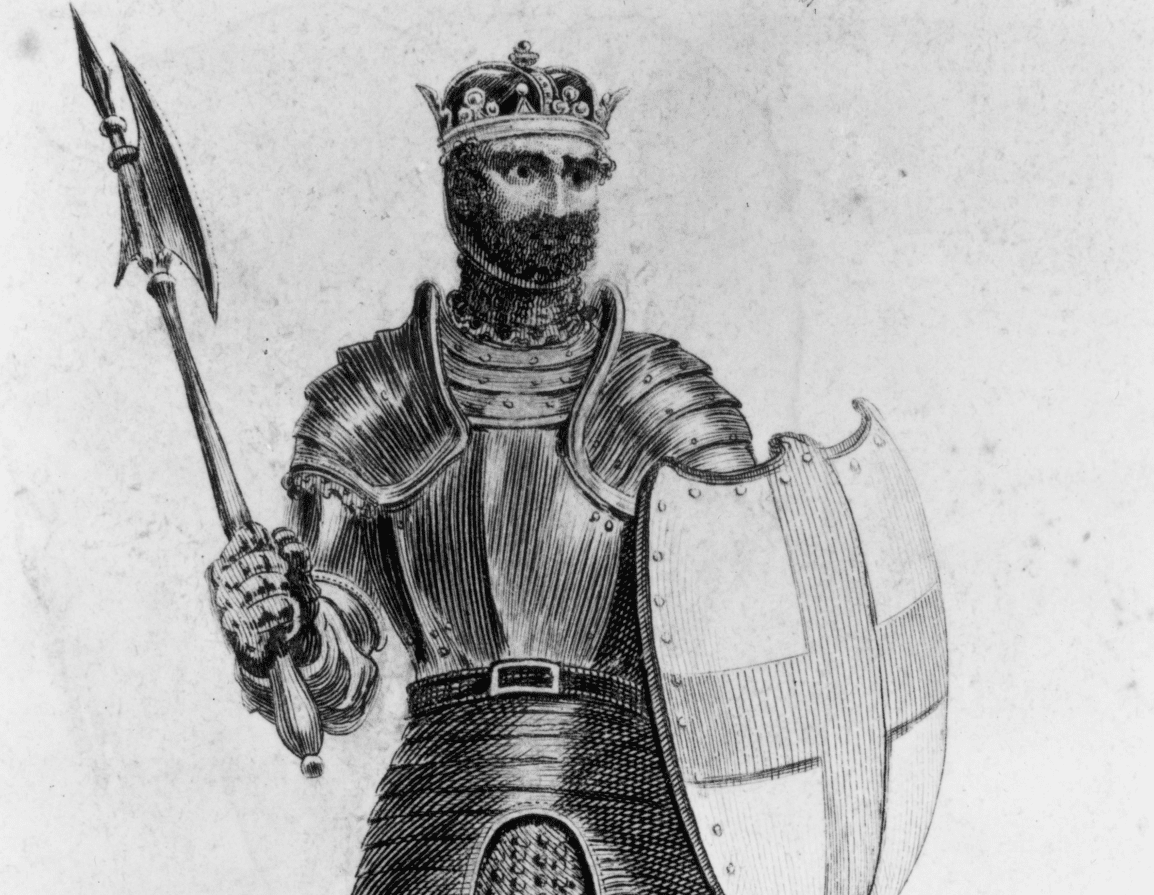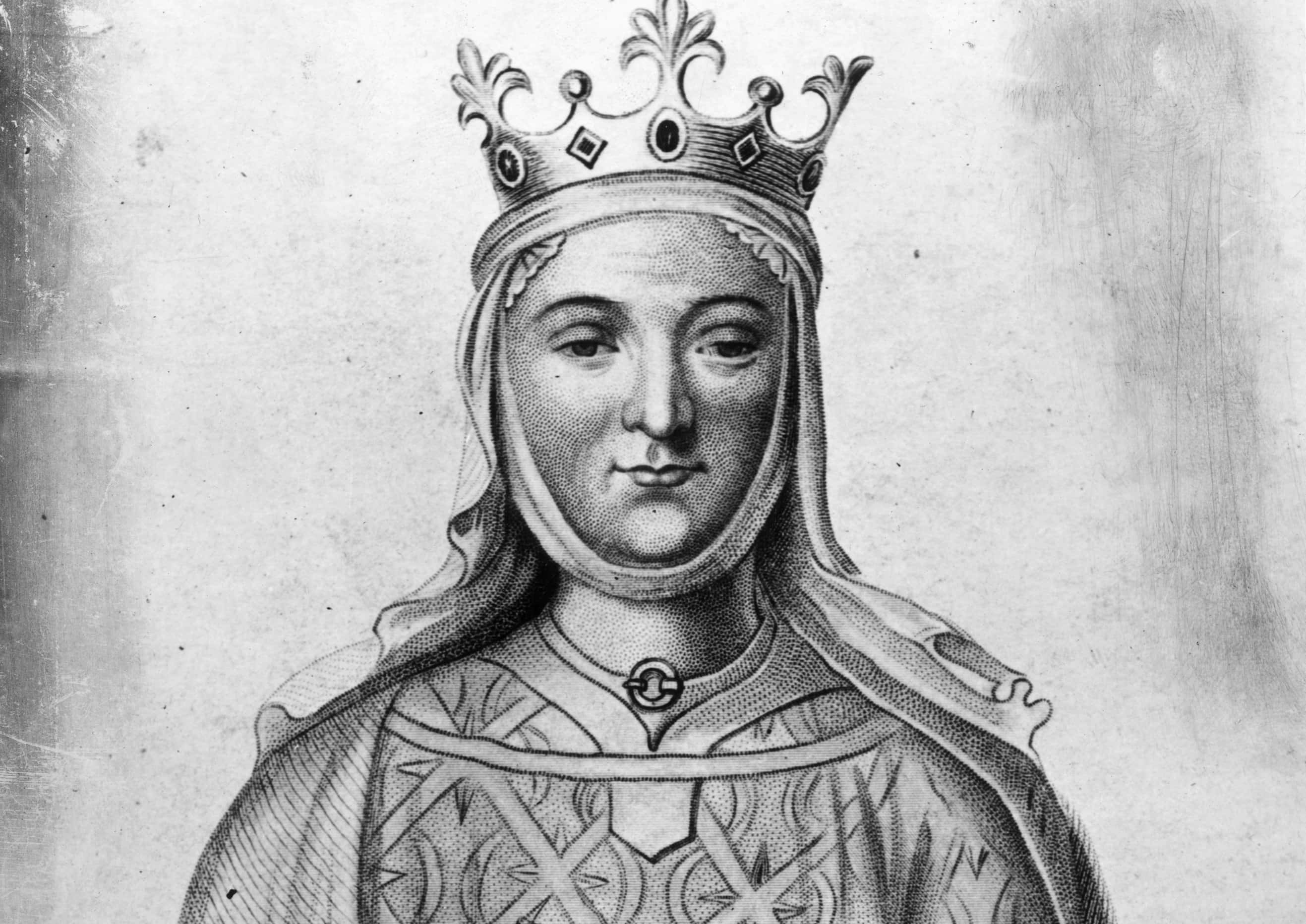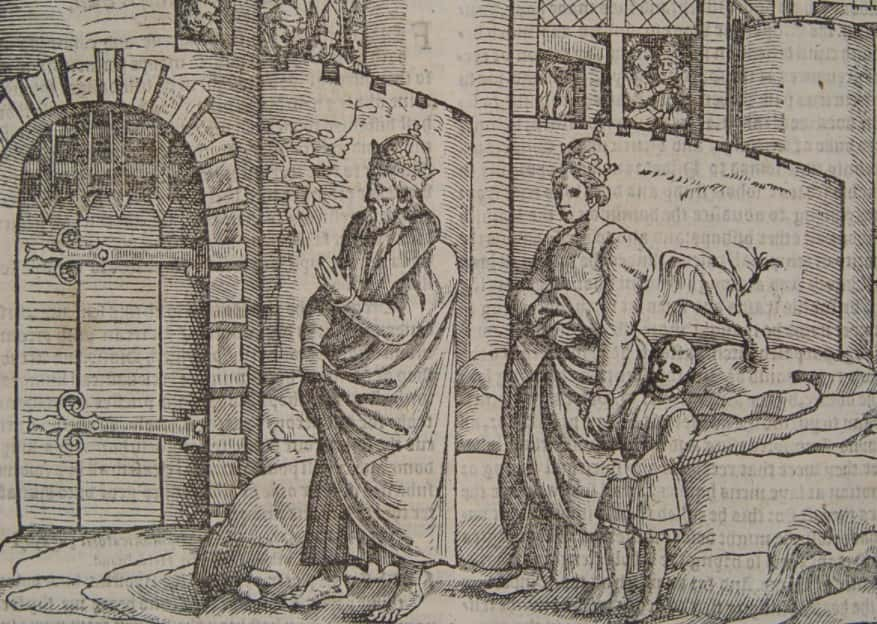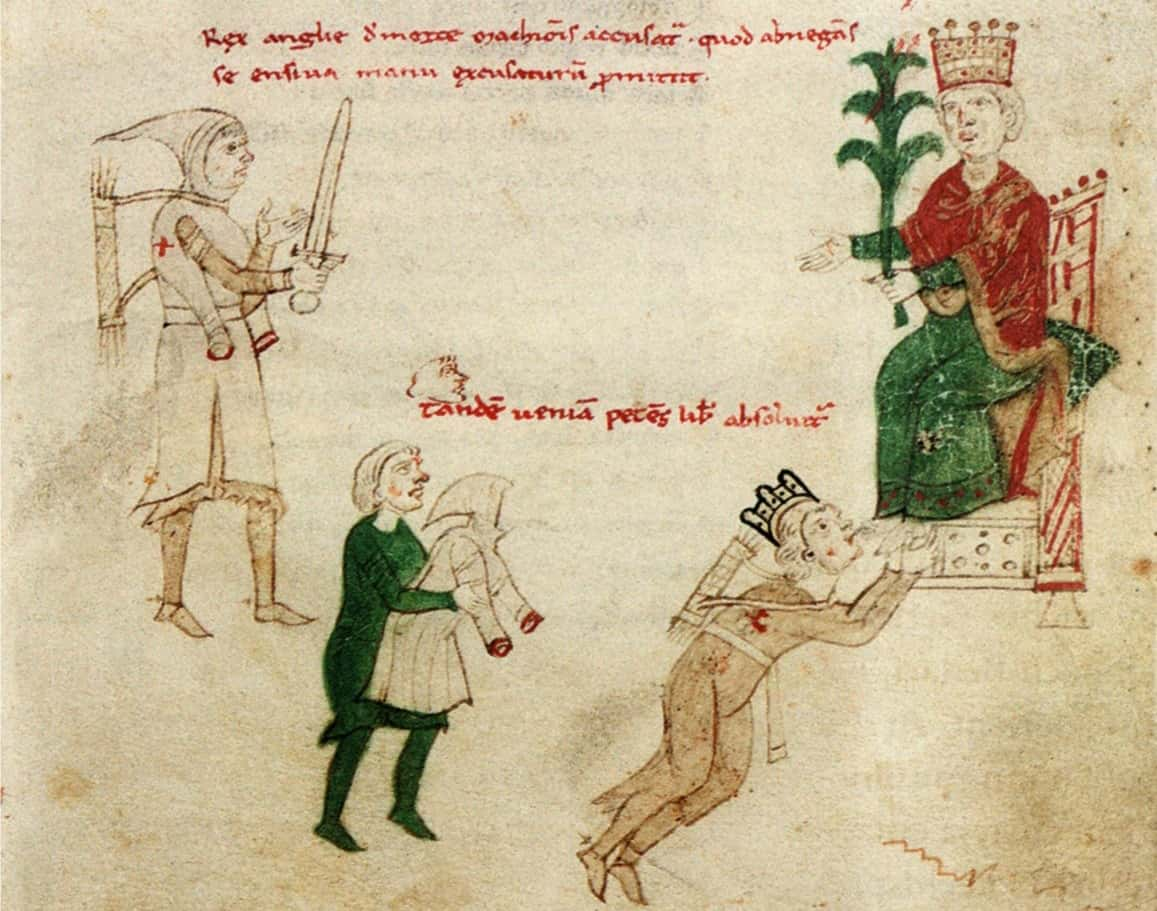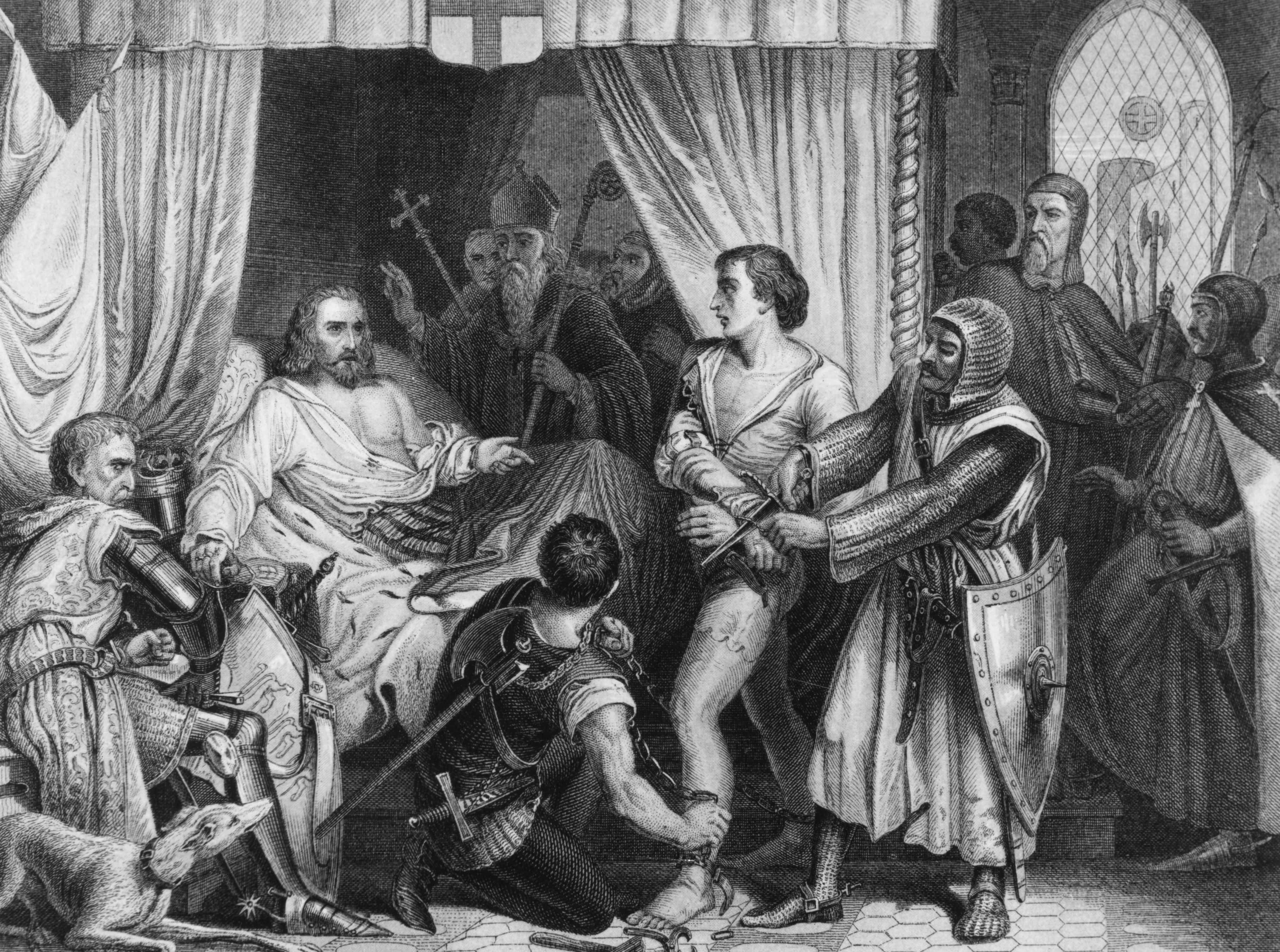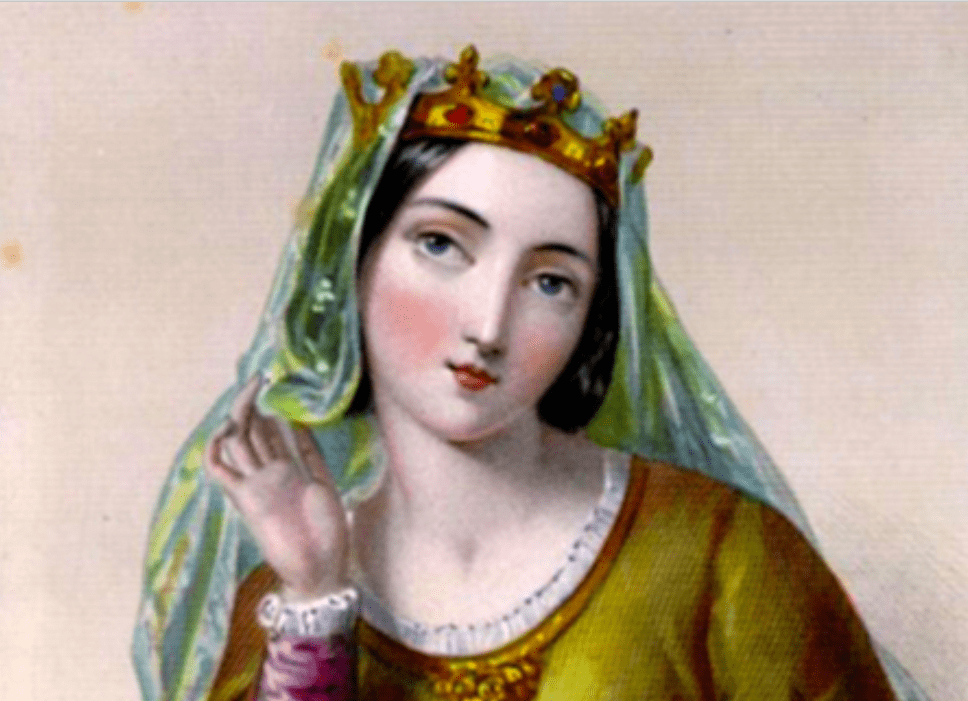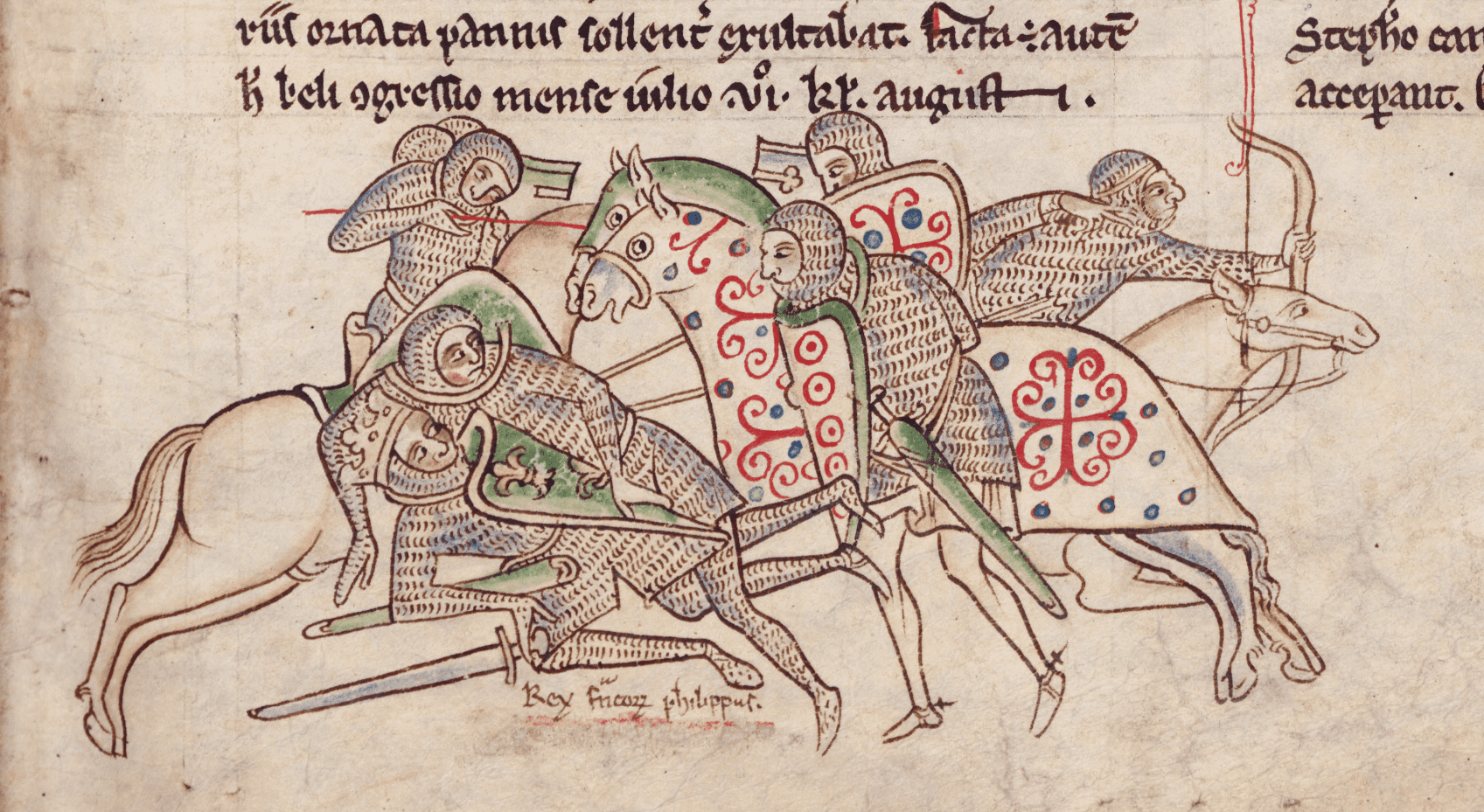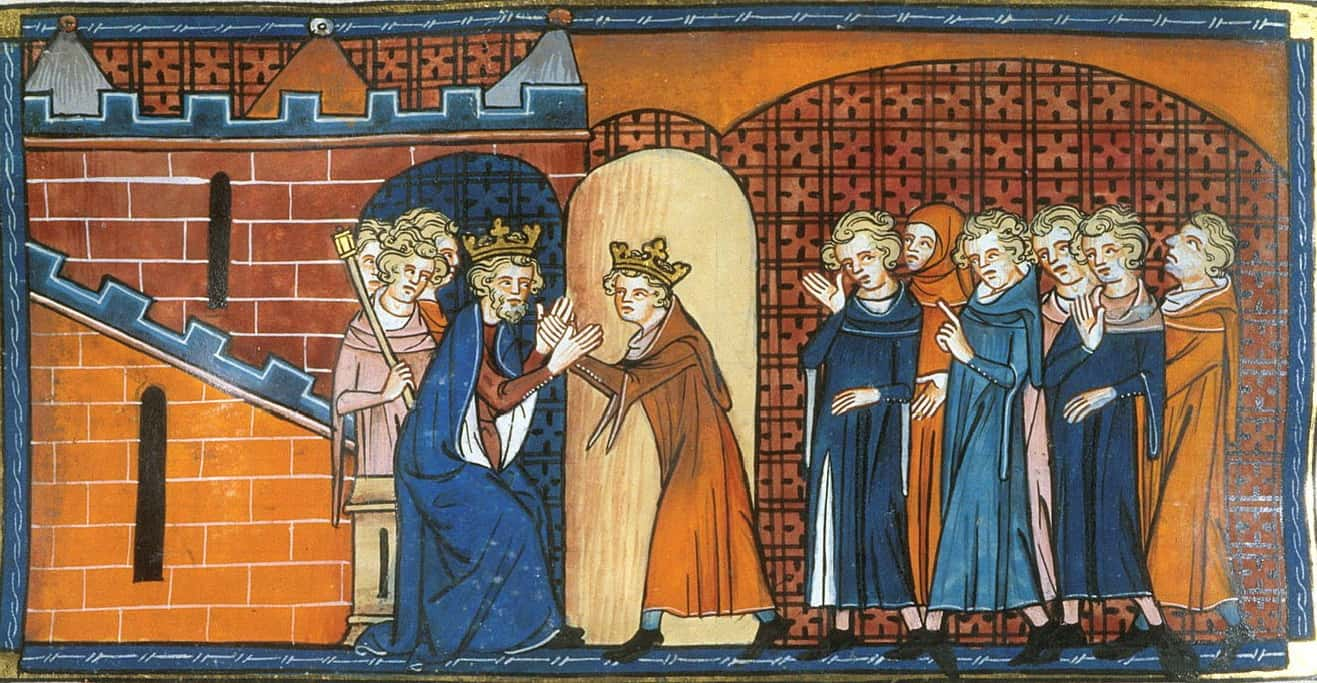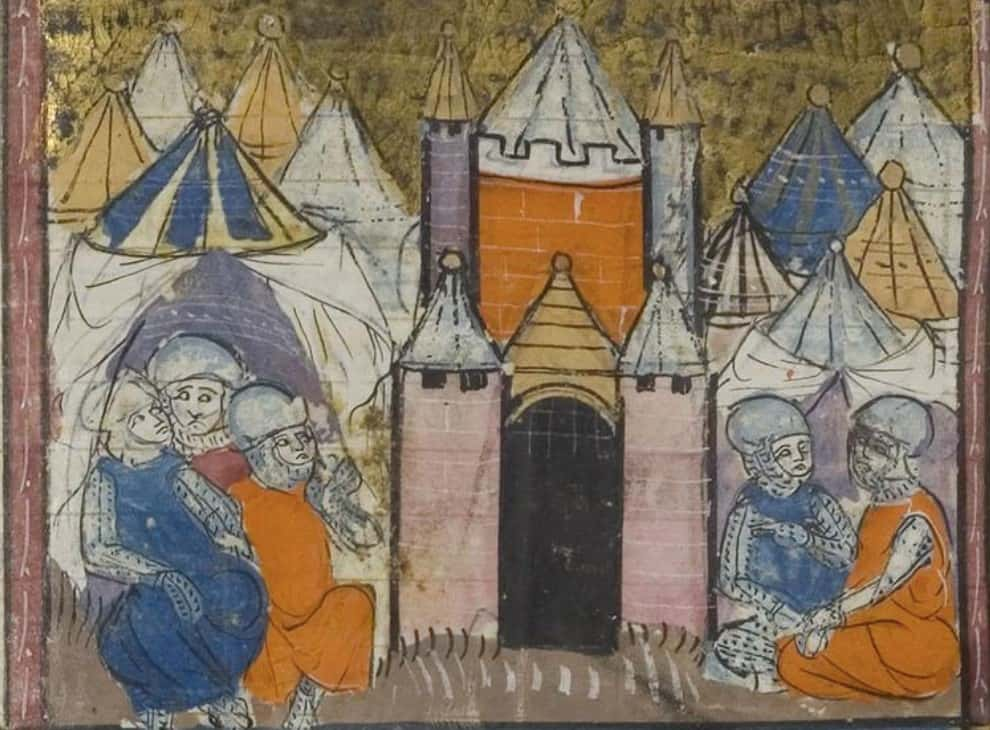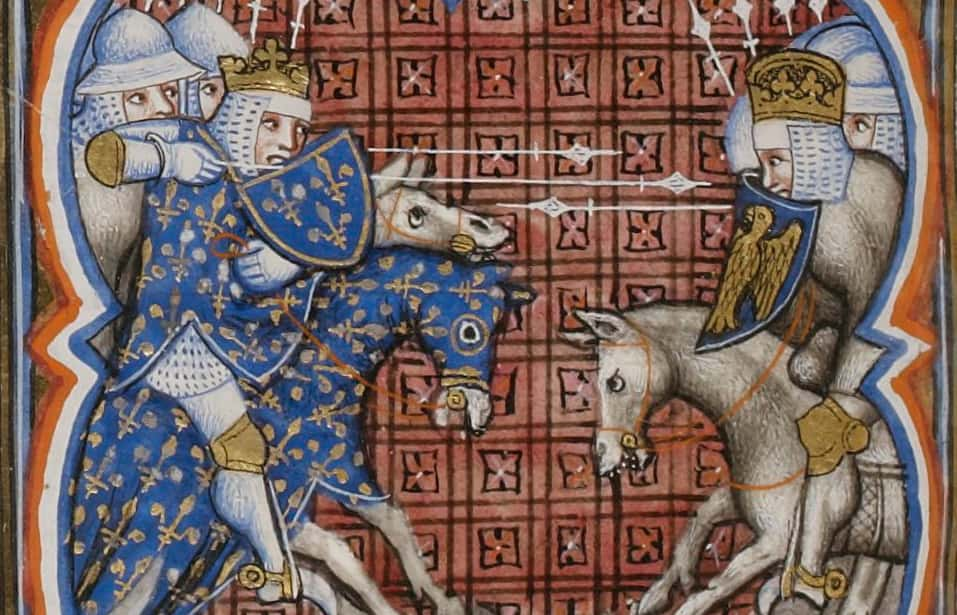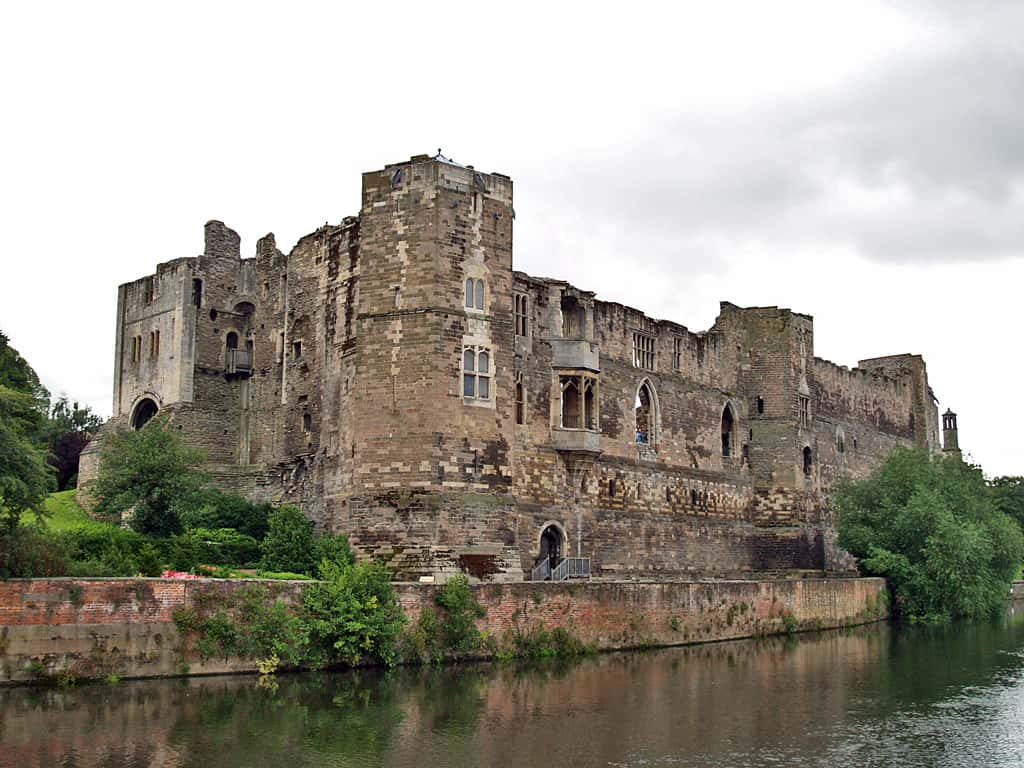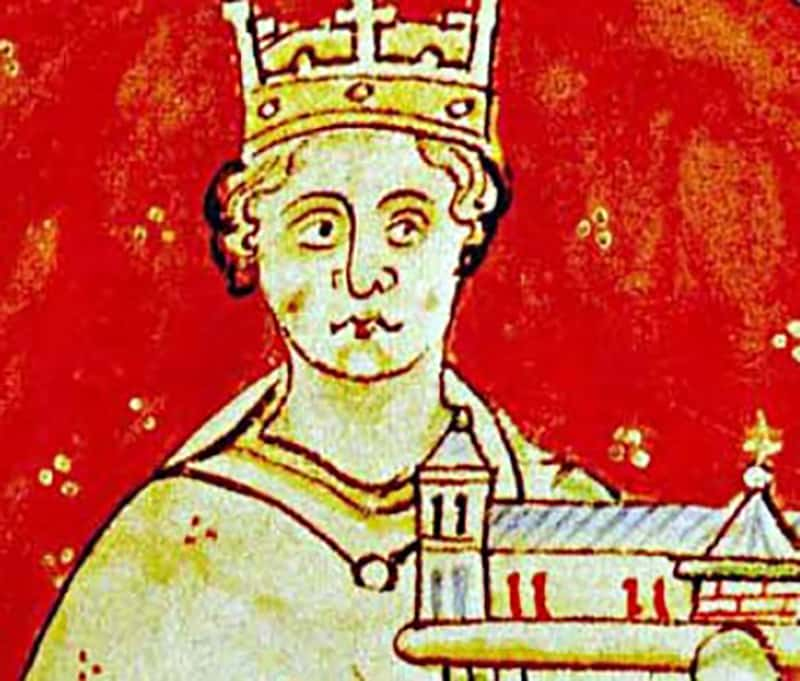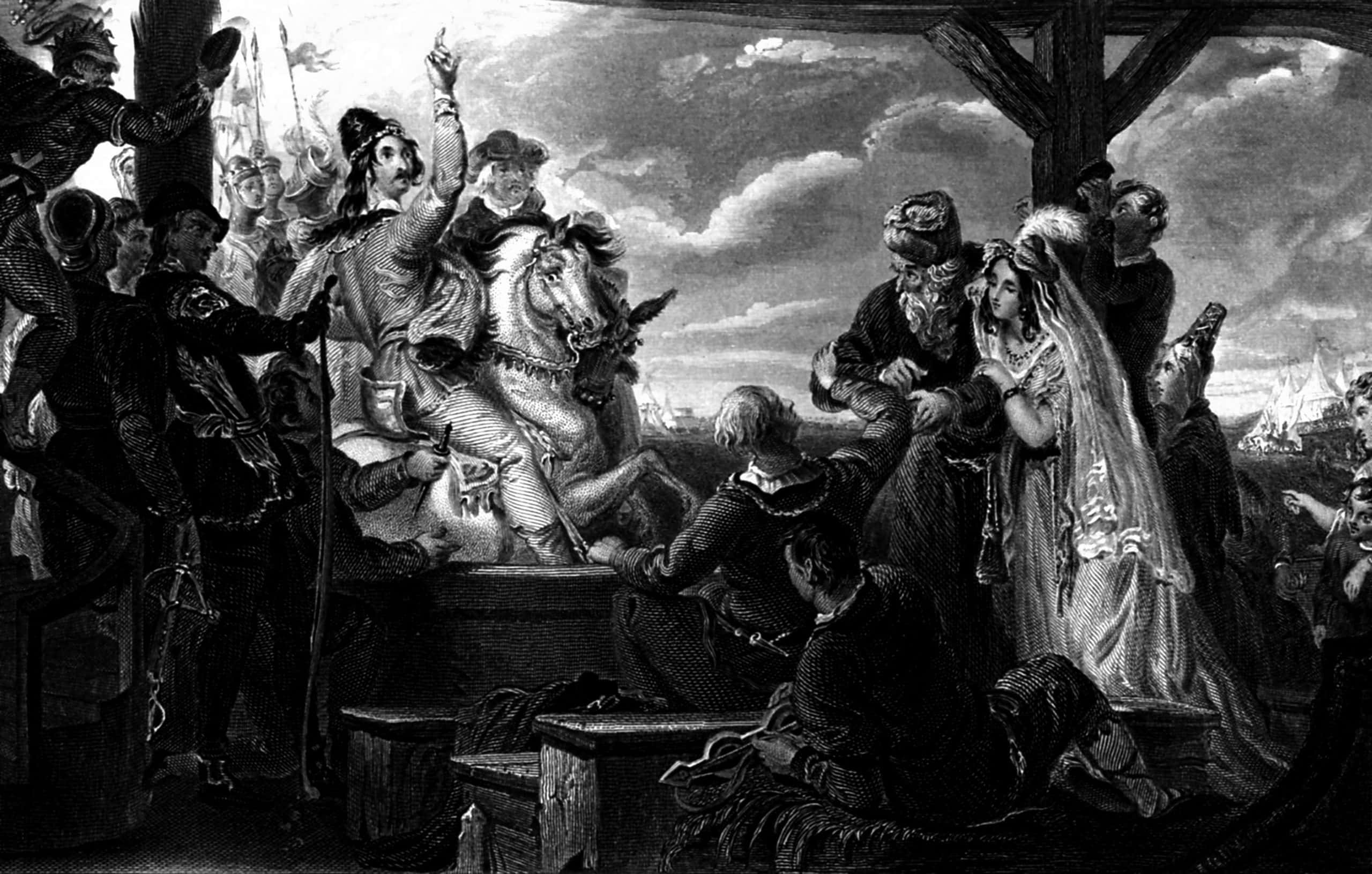Most people think of King John as the sniveling usurper who plagued Robin Hood, but the real man was far more complicated—and far more twisted. Born a forgotten fourth son to King Henry II, the wily and cunning John played his family against each other until he was the only one left on top. But while John knew how to take a throne, he didn't know what to do with it once he had it, and his reign was one of the most disastrous in England's history.
1. He Came From A Powerful Family
We know John as the King of England, but he should have had so much more than that. When John was born, his father, King Henry II, ruled over the Angevin Empire, which included England and nearly half France. His mother, the infamous Eleanor of Aquitaine, brought even more territories in the South of France. Had the Angevin Empire continued, France and England might still be one country today.
But the Angevin Empire crashed and burned—and the catastrophic rule of King John is to blame.
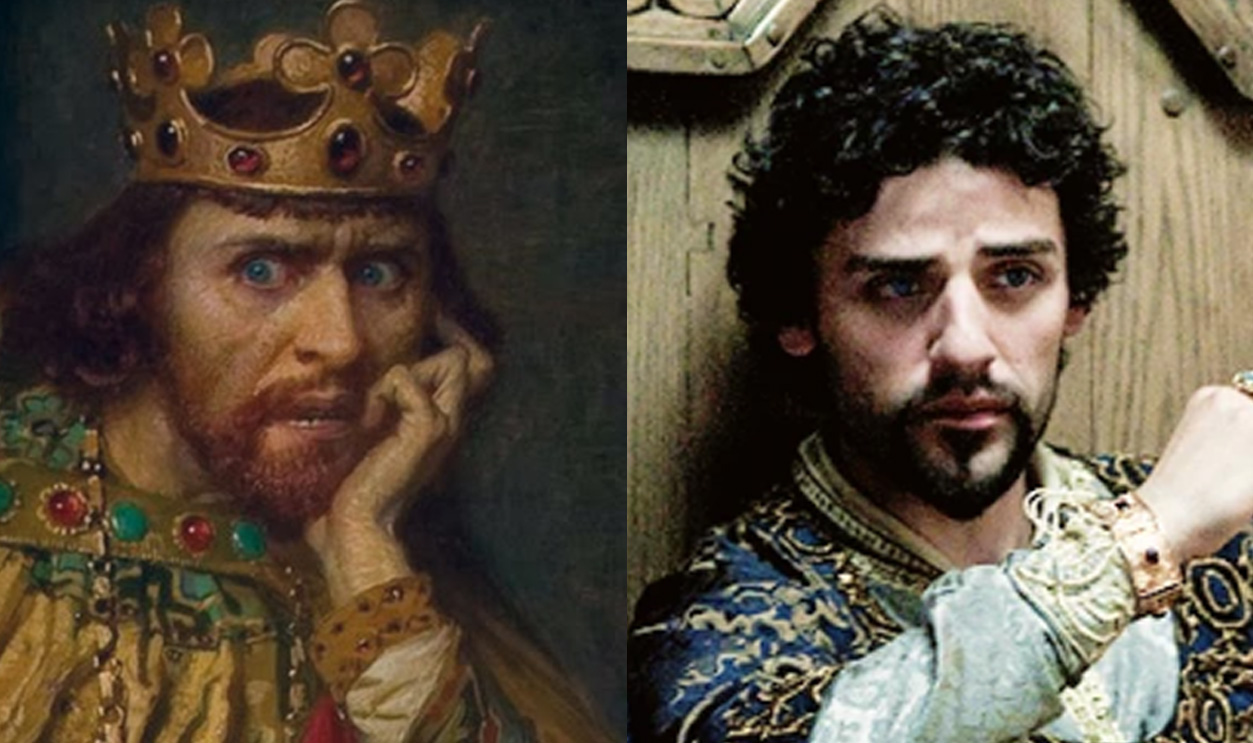
2. His Parents Abandoned Him
John's mother and father might have been two of the most powerful people in Europe, but that didn't make them good parents. Soon after his birth, Eleanor handed John off to a wet nurse, then ditched him to return to the capital of Aquitaine. She was far too busy conspiring against her equally-absent husband Henry II to spend any time with little John.
John and his sister Joan ended up spending a lonely childhood at Fontevrault Abbey, rarely seeing their powerful parents. Maybe the boy hoped he'd see more of his parents as he grew older—but he was about to learn just how cruel they could be.
3. His Father Thought Little Of Him
John was his parents' fourth (surviving) son. While their older boys Henry, Richard, and Geoffrey stood to inherit great fortunes and massive swaths of land, there wasn't going to be much left for the runt of the litter. It must have been painful for John growing up, knowing how little he meant in his family. His father's cruel nickname must have made it even worse.
Henry II called his youngest "John Lackland," in case he ever forgot he stood to inherit nothing. Eleanor pushed John towards a life in the Church, while his brothers were going to run the empire. Well, the ruthless and ambitious John had something to say about that...
4. His Family Was A Hot Mess
John wasn't supposed to inherit anything, but he had one thing going for him: He came from one of the most dysfunctional families in history. King Henry II didn't really trust his three older sons, and he refused to grant them any real power over the empire. As each of them grew older, they chafed under his restrictions. By the time John was a boy, the Angevin Empire was a den of infighting, backstabbing, and sometimes even open conflict.
The royal family played the game of thrones with the best of them, and the patriarch, King Henry II, needed every advantage he could muster. That meant bringing the forgotten son John onto the board. He couldn't have known it yet, but that would turn out to be a terrible mistake.
5. His Dad Had A Change Of Heart
Henry wanted to weaken his uppity sons' holdings, so he had a change of heart about that whole "Lackland" thing. Though John was only five years old, Henry had the boy betrothed to the Count of Savoy's young daughter, whose lands would then go to John upon his death. Tragically, John's young bride-to-be perished on the journey over the Alps—though knowing John, she might have dodged a bullet.
Don't worry, though, Henry still gave young John control over several powerful castles across France. The problem, however, is that one person, in particular, was absolutely furious about it.
6. Henry II Played Favorites
Wills are still a source of family drama today, and it was no different in the Middle Ages. You see, the three castles that King Henry II gave to John? Well, Henry II had already promised them to John's older brother, Henry the Young King. Henry II simply decided to give them over to John without even telling his eldest about it. The Young King was furious—and he decided to do something about it.
7. His Brothers Rebelled
Henry the Young King, who wanted more power and feared that their father would give even more of his lands to John, hit a breaking point. He revolted against his father—and he wasn't alone. Remember John's mother, Eleanor of Aquitaine? Well, she didn't like her husband sticking his nose where it didn't belong (ie. Aquitaine), so she pushed John's other brothers to join forces with the Young King against their father.
The family was in complete disarray—but no one had more to gain than John.
8. He Sucked Up To His Father
Where was John through all this? He was right at his father's side, the final remaining loyal son. Who do you think Henry II's favorite was now? The longer the rebellion dragged on, the more lands Henry II gave to John—mostly by ripping them away from various bitter nobles. Just a few years earlier, John seemed doomed to a lonely life in the Church while his brothers ran the world.
Now, he was quickly rising through the ranks of the royal family—and that made him a threat.
9. His Dad Set Him Up
Henry II now wanted nothing more than to give John "Lackland" as much land as possible—and he had some seriously shady means to get it done. The Earl of Gloucester was one of the richest men in England, but he planned to split up his lands among his many daughters. Well, Henry had other ideas. He disinherited all of the earl's daughters except for one: Isabella.
Then Henry II betrothed John to Isabella, setting him up to become one of the richest men in the empire. This was no fairy tale romance, though—it was more like a horror story.

History's most fascinating stories and darkest secrets, delivered to your inbox daily.
10. His Marriage Was Messed Up
John and Isabella were mere children when they were betrothed—but that's not even the twisted part. The two of them were related through their great-grandfather, King Henry I. That was close enough that their marriage should have been unlawful based on consanguinity. The Archbishop of Canterbury certainly thought so, and he banned the two cousins from marrying.
But when Henry II wanted something, he got it, and he was willing to do whatever it took.
11. He Couldn't Do The Deed
Ok, so the Archbishop said no to John's marriage, so why not go over his head? Henry II took his case straight to the Pope. He must have buttered up the pontiff something fierce, because the Pope agreed to allow John and Isabella to marry—under one, completely bizarre condition. They weren't allowed to sleep together.
Is it any wonder this twisted marriage was doomed from the start?
12. He Was A Little Teapot, Short And Stout
I hope Isabella wasn't into tall guys. John grew older, but he didn't exactly grow "up". He maxed out at 5'5" tall, though he had a stout, barrel-chested body to make up for what he lacked in height. With his diminutive height, broad shoulders, and mop of dark red hair, he cut a strange figure—but when you get into his personality, he only grew stranger.
13. He Had Expensive Tastes
John was the medieval equivalent of a spoiled millionaire's son. He adored books and even maintained an incredibly expensive library of books to travel around with him. That was nothing compared to his extensive collection of jewels and his wardrobe full of the finest clothes money could buy. He enjoyed backgammon, gambling, and hunting to a degree that bordered on obsessive.
All of this sounds fairly normal, if a little eccentric—but anyone who knew him quickly realized there was something...off about John.
14. He Was A Little Deranged
John's mood swings could break the sound barrier. Though sometimes "genial, witty, generous and hospitable," that only made his darker moods all the more disturbing. He was extremely touchy, incredibly jealous, and prone to sudden and violent fits of rage. Without an outlet for his anger, many noted that he would often gnaw on his own fingers in blind rage.
However, beneath the fine clothes and wild mood swings lay a cunning and ruthless mind, and that made John extremely dangerous.
 Robin Hood (2010), Universal Pictures
Robin Hood (2010), Universal Pictures
15. His Brother Met A Gruesome End
The constant infighting that haunted John's family soon claimed its first victim. John's oldest brother, Henry the Young King, started a war with the middle brother Richard over one slight or another, but he bit off more than he could chew. The conflict accomplished basically nothing, and all Henry got out of it was an agonizing demise from dysentery.
With the primary heir to Henry II's empire gone, everyone moved up in the world. Henry made Richard the King of England, and gave John Richard's old territory of Aquitaine. And that all went smoothly and no one got upset about anything, right? Right??
16. His Family Kept Fighting
You've seen how much this family fights, so did you really think that Richard was going to give up a territory as rich as Aquitaine that easily? He bunkered down and basically said, "Come and take it". Furious, Henry ordered John and his other brother Geoffrey to gather a force and take the duchy from Richard by any means necessary. John and Geoffrey stormed the capital at Poitiers...so Richard responded by attacking Geoffrey's territory in Brittany.
This family was a total mess—but after years of scheming and fighting, they were finally getting sick of it.
17. They Called A Truce
Clearly, all this fighting was getting no one in John's family anywhere. The conflict reached a stalemate, and the whole family met up in England to call a truce. Richard ended up keeping Acquitane, but here's the thing: John, now a temperamental teenager, got his first taste of real power—and he liked it. If Henry II had known what was good for him, he'd have just sent John off to the Church and forgotten about him...
 Robin Hood (2010), Universal Pictures
Robin Hood (2010), Universal Pictures
18. He Got Ireland
Henry II still wanted to get some serious land for his favorite son, so why not Ireland? He sent John and a large entourage to the Emerald Isle to start running things there. Finally, John actually had real power. And what did he do with it? He completely screwed it all up.
19. He Screwed It All Up
It's hard to imagine John doing a worse job in Ireland. To be fair, he had his work cut out for him: The Angevins had only recently conquered the island, and the Irish still weren't exactly happy about it. It was going to take a delicate hand to secure control of Ireland—and John was more like a bull in a china shop. Upon first meeting local Irish leaders, the tactless John chortled and made fun of their long beards, offending them basically instantly.
John lasted a year in Ireland. In that time, he managed to anger the locals, alienate pretty much all his Angevin allies, and lose a bunch of ground to Irish rebels. He eventually slunk back to England with his tail between his legs, placing all the blame on his viceroy, Hugh de Lacy's shoulders. And this was just the beginning of a lifetime of failures...
20. He Turned On His Own Father
Remember that truce John's family had agreed upon? Turns out, it wasn't worth the paper it was written on. Henry II grew old and weak—and John's brother Richard saw blood in the water. He allied with Philip II, the King of France, and declared war on his stumbling father. In a shocking twist, after a lifetime as his father's lapdog, John actually turned coat and sided with Richard.
Henry II was used to fighting his older sons—but John's betrayal was too much to bear.
21. His Father Met A Sad End
Henry II had no fight left in him. He waved the white flag, acceded to Richard's demands, and passed on soon after. Richard became the new king, and he had only one thing on his mind: the Crusades. Richard desperately wanted to fight the Holy War in the Middle East, but he knew that was risky. He'd spent his entire life squabbling with his parents and brothers over the Angevin Empire, so he realized someone might take it as soon as he left.
So Richard came up with a plan to appease his shifty little brother—but trusting John was always a terrible mistake.
22. His Brother Tried To Buy His Loyalty
To buy John's loyalty, Richard showered him with valuable territories in Cornwall, Derby, Devon, Dorset, Nottingham, and Somerset. He hoped that with all that wealth, John would just sit by and watch over the empire in Richard's name while his lionhearted brother fought Saracens in the Holy Land. Do any of us think that that was going to happen?
23. He Made A Deal
Richard named his four-year-old nephew Arthur heir to the empire and forced John to promise not to step foot in England for three years. The way he saw it, that gave him plenty of time to go off, crusade to his heart's content, then come back to reclaim his throne. John happily agreed; he would never dare try to usurp his brother's throne. Of course not...
24. He Found A Way
It didn't take long for John to get to work. He knew that the people of England were unhappy with Richard's rule thus far, and he saw his chance to strike. First, he convinced his mother Eleanor to persuade Richard to let him back into England. Richard relented (Eleanor of Aquitaine had a certain way with people), and John quickly crossed the Channel, establishing himself at the royal court.
He claimed he only meant to keep the throne warm for his brother—but you and I both know he had more sinister intentions than that.
25. He Spread Dark Rumors
The years began to pass, and yet still Richard, the supposed "King of England," remained nowhere to be found. Pretty soon, people in England began to see John as their de facto ruler—perhaps even the next king. Did John anything to dissuade them of that notion? Nope! In fact, he started spreading rumors that Richard had lost his life in the crusade—or, at the very least, was lost forever.
Ironically, though John was lying through his teeth, he wasn't actually that far off.
26. His Brother Found Himself In Hot Water
Richard was still very much alive and actually had begun his trip back to England after years abroad. Unfortunately, Duke Leopold of Austria had captured him en route and handed him over to the unscrupulous Henry VI, Holy Roman Emperor. Now, it's never a good look for a king to get captured—and John knew it. This was the best opportunity he was ever going to get, so he went all in.
27. He Made A Deal With The Devil
John wanted all of the empire to himself, and there was only one person powerful enough to help him get it: Philip, the King of France. When John heard the news of his brother's capture, he jumped on the next ship across the Channel, bound for Paris. He persuaded Philip to form an alliance with him—though he had to be utterly heartless to do it.
 Robin Hood (2010), Universal Pictures
Robin Hood (2010), Universal Pictures
28. He Ditched His Wife
How did John convince one of his greatest rivals to ally with him against Richard? Simple: He agreed to marry Philip's sister, Alys. But wait, wasn't John already married? Well, don't worry, that wasn't going to be a problem. Believe it or not, the cousins who were betrothed as children and barred from ever sleeping together as husband and wife did not have a happy marriage.
John didn't hesitate to have his marriage annulled, leaving his wife out in the cold in order to marry Alys. It looked like everything was finally starting to come together for John—of course, that's right when everything started falling apart.
29. He Openly Rebelled
The time for all this scheming and maneuvering was over. Back in England, the lines had been drawn: There were those who supported Richard, and those who backed John. With the sides chosen, fighting broke out, and it quickly turned ugly. And remember how badly John had screwed up in Ireland? Well, this is the same guy we're talking about, and his conflict with Richard went about just as well...
30. He Couldn't Hit Fish In A Barrel
Even with Richard in captivity, John just couldn't gain a foothold against the forces loyal to his brother. By the time Richard escaped his imprisonment and limped back to England, John had accomplished nothing. His forces surrendered pretty much the second that Richard stepped foot on England, and John, as he always did, fled with his tail between his legs.
He ran away to Normandy and tried to lay low, hoping his brother would forget about that whole "treachery" thing. Richard, of course, found him before long—yet his response to John's betrayal surprised everyone.
31. His Brother Shaded Him
Apparently, Richard the Lionheart, the fierce crusader king, was a big softie deep down. He forgave his 27-year-old brother, saying he was only "a child who has had evil counselors". Now, I don't know about you, but that sounds like an insult to me. The greater insult was certainly removing nearly all of John's lands. Obviously, John seethed under the humiliation—but his time was coming.
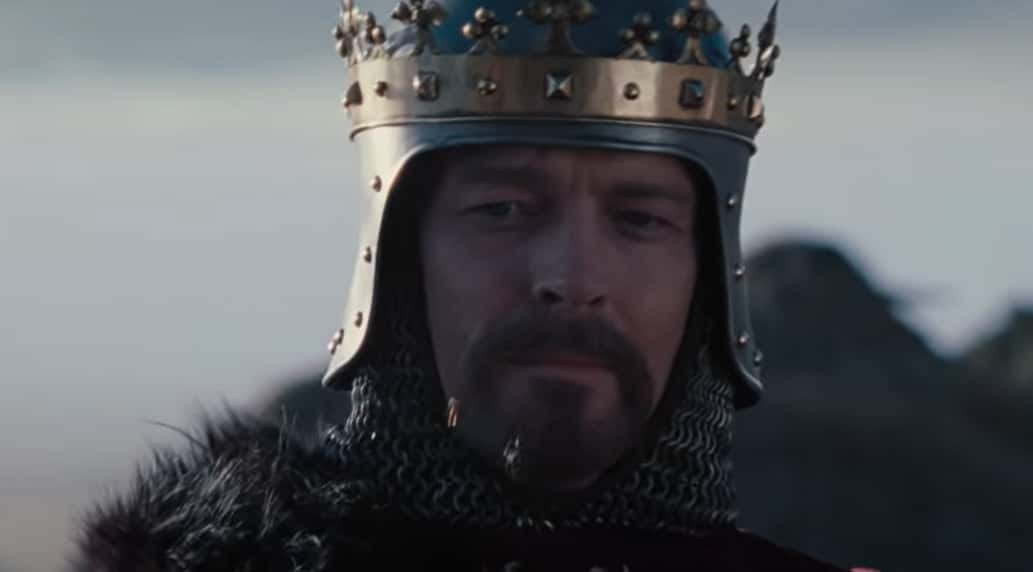 Kingdom of Heaven (2005), Twentieth Century Fox
Kingdom of Heaven (2005), Twentieth Century Fox
32. His Chance Came
After his laughable failed coup, John bided his time and waited for his next chance to strike. That chance came when Richard took a crossbow bolt to the shoulder. The wound soon festered, and the warrior king quickly faded away. The lion's heart stopped in 1199, leaving a power vacuum behind. John, of course, wanted to be the one to fill it—but could he handle it if he got it?
33. He Had To Fight His Nephew
The succession crisis after Richard's passing was a complete mess. There were two claimants to the throne: John and his nephew Arthur, still a young boy. To make matters worse, Norman law favored John, while Angevin law favored Arthur. Within a matter of months, the crisis broke out into open conflict—that was really the only way John's family knew how to solve problems.
Now that John was the only brother left, he wasn't going to roll over for some punk kid—and that drove him to make a terrible decision.
34. He Did It Again
John had already made one deal with the devil, so why not do it again? He negotiated a peace with King Philip of France not long after Richard's passing. In the treaty, Philip recognized John as Richard's heir, while John accepted Philip as the feudal overlord of his territories in France. His brother would have fought tooth and nail for sovereignty, but John was no warrior.
John's weak diplomacy disgusted the Normans, who took to calling the new king "John Softsword" for his craven deal. Still, it managed to earn John some peace—until he managed to mess everything up yet again.
35. He Wanted A New Wife
Remember how John had planned to ditch his wife to marry the French king's sister? Well, that deal fell through, but now that the idea was in John's head, his poor wife was doomed. He couldn't wait to marry the next candidate who caught his eye—but John's tastes were disturbing, even for the Middle Ages...
36. He Liked Them Young
John's scandalous second marriage would cost him everything, so who was this woman who made him throw away all that he'd worked for? Well, "woman" might not be the word. More like, "girl". When John first laid eyes on Isabella of Angoulême, it was allegedly love at first sight. The twisted part? She was only a child. Though no exact record of her age exists, contemporary chroniclers noted that she was too young even for the time.
And in a world where people married 13-year-olds at the drop of a hat, that means she was way too young, but John couldn't be stopped.
37. She Was Already Taken
Isabella's age was just one part of the problem. How about the fact that she was already engaged to someone else? Isabella was supposed to marry the powerful Hugh IX of Lusignan, who just so happened to be a political rival of John's. John, AKA "Mr. Steal Yo Girl," swooped in and decided to marry Isabella himself, and he didn't even have the decency to make it up to Hugh.
Instead, John treated Hugh with open contempt—and that would come back to bite him in a brutal way.
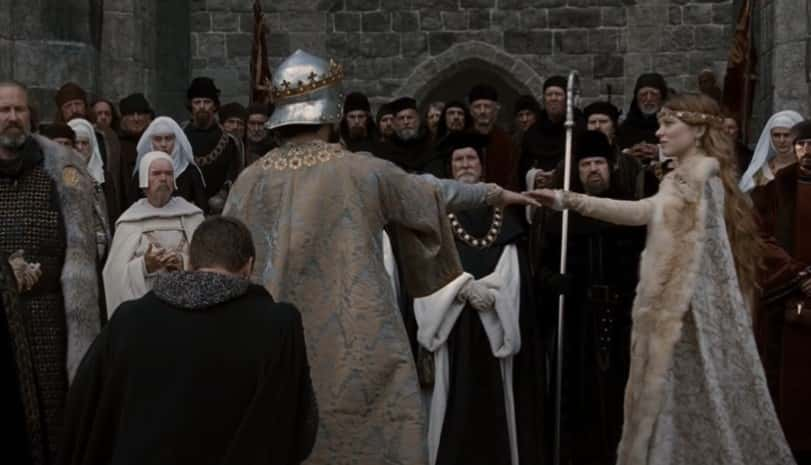 Robin Hood (2010), Universal Pictures
Robin Hood (2010), Universal Pictures
38. She Was The Helen Of Europe
So who was this young girl causing all of this fuss? Even as a child, Isabella of Angoulême was famous for her stunning blue eyes and shock of blond hair. However, she wasn't some calm, seraphic beauty. Turns out, Isabella was better for John than you'd think. Much like her soon-to-be husband, she possessed an utterly chilling temper—as anyone in her household could attest.
John was allegedly completely infatuated with his fiery bride. Little did he know, this marriage would be the worst mistake of his life.
 Robin Hood (2010), Universal Pictures
Robin Hood (2010), Universal Pictures
39. He Didn't Listen
Hugh IX wasn't about to take John's treachery lying down. He did what all great men do: he tattled. Hugh took his case straight to King Philip of France, who ordered John to come to Paris to make amends. John, who never liked being told what to do, said, "Screw that," and stayed put with his child bride. I don't know what he thought would happen, but the consequences for his actions were so much worse than he could have possibly imagined.
40. He Had to Fight For It
Maybe Philip was offended by John's child bride, or maybe he was just fed up with the upstart king in general (I know I would be...). Either way, he brought the hammer down. He revoked John's claim to all of his territories on the continent, including his ancestral home of Normandy. King John now found himself at war once again, fighting for his birthright, all because he wanted to marry one particular young girl.
It was during this new conflict that John showed the darkest side of himself yet.
 Ironclad (2011), VIP 4 Medienfonds
Ironclad (2011), VIP 4 Medienfonds
41. He Let Them Rot
In King John's day, even in combat, nobles generally treated each other with respect. Aristocratic captives still received comfortable treatment—that is, unless John happened to be your captor. Through early victories, John managed to capture dozens of the rebel force's key leaders. These men expected to receive just treatment—but they didn't know King John.
John completely ignored his prisoners, allowing them to rot in horrific conditions. Things got so bad that 22 of his prisoners quickly succumbed to illness. A lifetime of struggle had turned John into a merciless tyrant—and it cost him everything in the end.
 Ironclad (2011), VIP 4 Medienfonds
Ironclad (2011), VIP 4 Medienfonds
42. He Started Losing
John's treatment of his prisoners absolutely horrified even his closest allies. Several of his key regional supporters deserted him and allied with King Philip of France. To make matters worse, John's campaign was starting to drag on, and he was running out of money fast. Philip, on the other hand, had plenty of resources to keep this fight going as long as he wanted.
John's foes were backing him into a corner—and it led him to one of the most disturbing acts of his life.
43. He Eliminated His Nephew
With his allies abandoning him left and right, John grew desperate. He knew he had to act fast or he risked losing everything. His biggest problem was that his nephew Arthur was still kicking around, a rival claimant to the Angevin throne. So he decided to take young Arthur out of the equation. He had his nephew captured, locked him up, and threw away the key.
No one ever saw Arthur again—but one source reveals the boy's dark fate.
44. He Ended Him Personally
Trying to hold onto his empire was beginning to wear on John, and he grew irritable, cruel, and paranoid. He began drinking heavily, and one night, three sheets to the wind, he did the unforgivable. After far too many drinks, John allegedly stumbled into his nephew's cell and ended the boy himself. He then snuck the body out to the Seine, tied it to a heavy stone, and threw it beneath the waves.
The cunning Prince John of his youth had disappeared, and only a twisted, impulsive tyrant remained—but unfortunately, he couldn't sink all of his problems to the bottom of the Seine.
 Robin Hood (2010), Universal Pictures
Robin Hood (2010), Universal Pictures
45. He Lost Almost Everything
Everything began falling apart after John slew his nephew. His losses started piling up, and he had to retreat back across the Channel to England. From there, he received devastating news: His mother, Eleanor of Aquitaine, finally passed on at the ripe old age of 82. Losing his mother was hard enough, but her steely grip on Aquitaine was essential to his rule.
King Philip went for the jugular. In one fell swoop, he invaded and claimed Normandy, Anjou, and Poitou. Now, all that remained of the once-formidable Angevin Empire was England and Aquitaine. John's empire was falling apart—but at least there was one bright spot.
 Ironclad (2011), VIP 4 Medienfonds
Ironclad (2011), VIP 4 Medienfonds
46. At Least His Kids Turned Out Alright
John's messed-up marriage to Isabella cost him greatly, but at least he got a lot of children out of it. Within just a few years, Isabella had given him two sons and three daughters, including the future King Henry III of England. Extremely rare for medieval royals, all five of the kids survived to adulthood and became powerful nobles in their own right.
This is a miracle, considering the total mess their father left them with...
47. He Made A Mess In England
King John kept losing territory left and right, but at least he still had England, right? Well, about that...While John had been making a mess of things over on the continent, he'd been doing an equally bad job in England. He allowed his cronies, a bunch of uncivilized mercenaries, to take up important positions in the English court. This made the English barons absolutely furious, watching John give all of their lands and titles to a bunch of brutes.
Yet again, John's complete and utter lack of tact was going to come back and bite him.
 Robin Hood (2010), Universal Pictures
Robin Hood (2010), Universal Pictures
48. His Barons Despised Him
John's barons already hated him—but his cruel treatment made them want to end him. He distrusted any baron who seemed powerful enough to challenge him, but instead of trying to gain their respect, he tried to make their lives as miserable as possible. Pretty soon, almost every baron had a good reason to despise him, but the worst example by far was William de Braose, one of the most influential men in the British Isles...
 Robin Hood (2010), Universal Pictures
Robin Hood (2010), Universal Pictures
49. He Ruined A Whole Family
For no good reason, King John demanded that de Braose give him 40,000 marks. When the baron refused to pay, John exiled him, then imprisoned his wife and son. The atrocious conditions John kept them in cost them their lives before long, and De Braose himself passed on while still in exile. After this nightmare, even the most loyal barons realized that John might turn on them at the drop of a hat. Something had to give.
 Robin Hood (2010), Universal Pictures
Robin Hood (2010), Universal Pictures
50. They Wouldn't Help Him
John expected his barons to support him no matter how he treated them—they had other ideas. In 1214, he began one more campaign to try and take his homeland of Normandy back from King Philip. He had the money, an experienced army, and several strong alliances on the continent. What he didn't bank on, however, was that many of his barons back in England just flat out refused to go with him.
Without the support of his own people, John's invasion turned into a disaster. Philip defeated his force, and John had a sign a humiliating peace treaty, putting the final nail in the coffin of his hopes of regaining Normandy. But once he made it back to England, things went from bad to worse.
51. He Gave Up His Power
Rebel barons, well and truly fed up with the tyrannical King John, raised a force of their own and marched on London. They easily took the city, and several nobles loyal to John betrayed him and joined forces with the rebels. Completely out of options, John had to wave the white flag and sign one of the most humiliating deals in the history of England.
The barons forced John to sign the Magna Carta, which completely hamstrung his power and gave the barons untold freedom. Signing such a deal should have been rock bottom for the miserable King John—and yet he still had further to fall.
52. He Had One Last Fight
While the Magna Carta is one of the most infamous charters in history, it didn't actually accomplish much. Neither John nor the barons abided by it, and it was only a matter of time before they ripped it up and decided to settle things the old-fashioned way. The rebels gathered a new army and planned to oust John by force. In a shocking move, they actually invited the French Prince Louis to lead them.
Even a French king would be better than King John at this point. John, now approaching 50, had to fight for his throne one last time—but after a lifetime of conflict, this infamous king was finally out of juice.
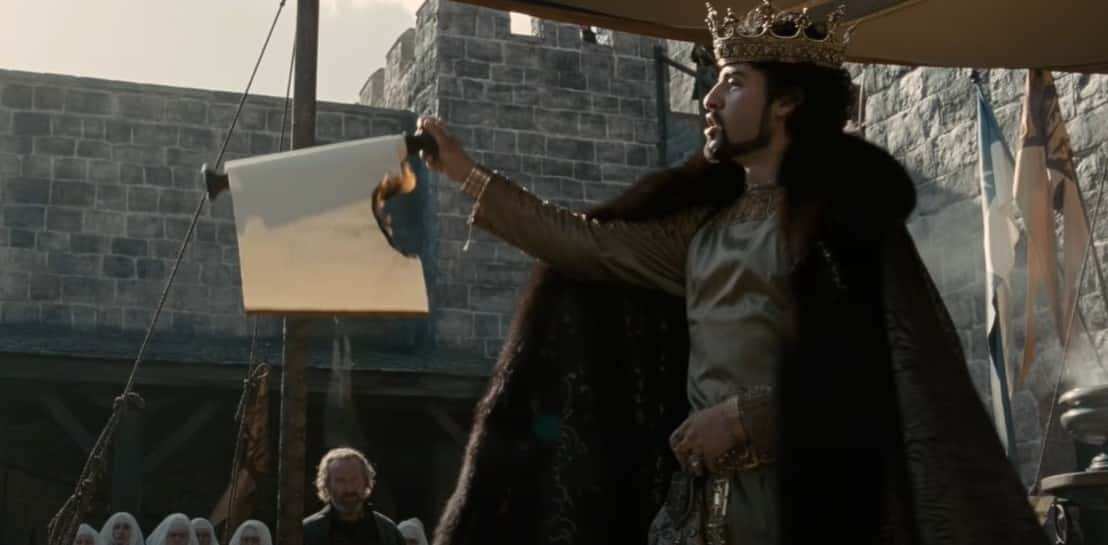 Robin Hood (2010), Universal Pictures
Robin Hood (2010), Universal Pictures
53. He Fell Brutally Sick
The First Barons War was a miserable end to a miserable reign. The two sides fought each other to a stalemate that showed little sign of letting up. Stubborn old John still insisted on leading his men from the front lines—and that eventually proved fatal. He contracted dysentery, yet still, he trudged on through the countryside, determined to deal with the rebel barons once and for all.
It really seemed like he couldn't possibly fall any lower. But this is King John we're talking about—there was always another rock bottom.
54. He Lost His Jewels
John dragged his army across the Wash, a dreary bay in East Anglia. While trying to cross one of the bay's many soggy estuaries, John lost most of his baggage train. The worst casualty? The English Crown Jewels, which disappeared into the mud along with everything else. Now John, still battling the horrific symptoms of dysentery, had lost not just his empire, but the very symbol of his power.
It was a humiliation beyond any he'd faced so far—but thankfully, his misery was finally nearing its end.
55. He Could Carry On No Longer
Dysentery is an extremely gruesome way to go, so it was a fitting end to John's gruesome reign. He managed to limp into Newark Castle, in Nottinghamshire, before his body finally gave out. He passed on in the night in October 1216, just over a year after he put his pen to the Magna Carta. Yet even with his final act, King John managed to prove he was a truly horrible person.
56. He Dealt One Final Betrayal
For the final decade of his reign, King John had kept his own niece, Eleanor, rotting in a cell. Eleanor technically had a claim to his throne, so he kept her locked up so she couldn't rise up against him. Well, now that he was gone, he shouldn't care about Eleanor anymore, right? Nope. In a final act of spite, John amended his will to state that Eleanor never be released from captivity.
That's just the kind of man King John was.
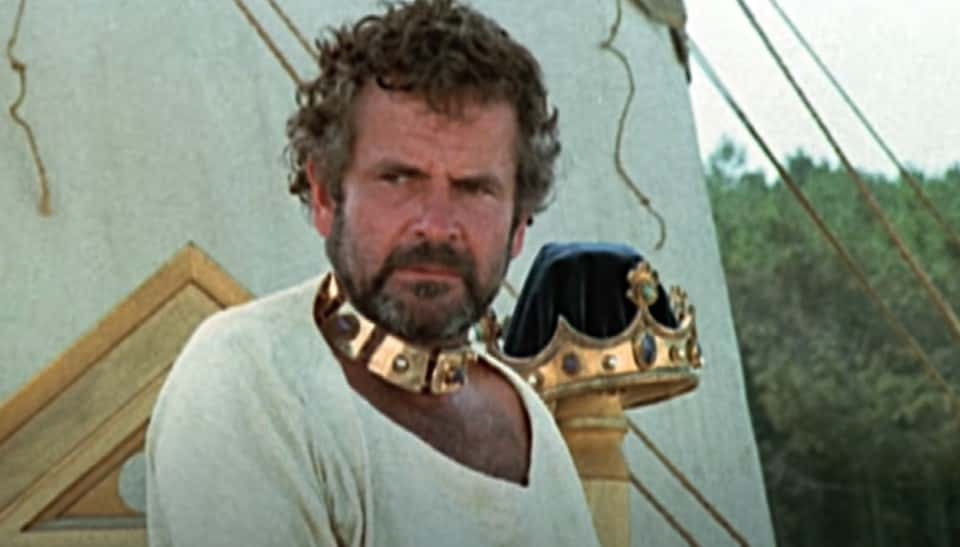 Robin and Marian(1976), Columbia Pictures
Robin and Marian(1976), Columbia Pictures
57. He Was A Horrible Guy
So what went so wrong for King John? Clearly, this forgotten fourth son had the cunning and ambition to become the King of England and more, so how did he screw it all up so badly? Most contemporary sources agree on the reason why: He was just a horrible guy. They called him sinfully lustful and horribly impious. His flippant attitude towards Christianity—once even making a joke about the likelihood of Jesus's resurrection—utterly scandalized the nobles of his court.
But his heresy was far easier to bear than his scandalous personal life.
58. He Had Scandalous Tastes
Remember John's first wife? The cousin whom he couldn't sleep with? Well, it should be little surprise that John took many mistresses during that first marriage. That was to be expected for a medieval king, but John's taste in women was the scandalous part. He just didn't take any woman as his mistress. He preferred noblewoman—married noblewomen.
So John insulted his barons to their face, took their money, locked them up without a care in the world, and slept with their wives? It's no wonder they rose up against him. Today, history remembers King John as one of the most despised monarchs England has ever seen—and I think you'd agree, he earned that title and then some.

